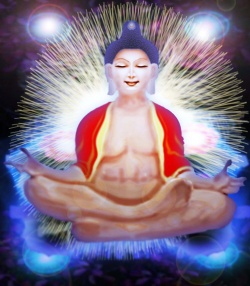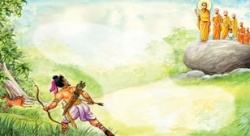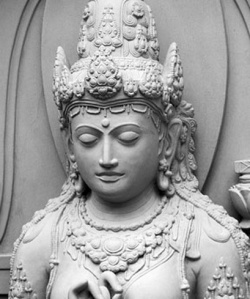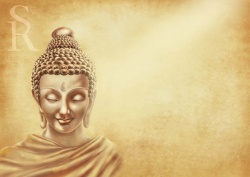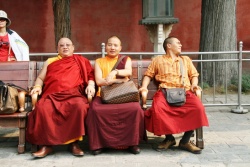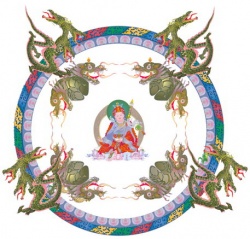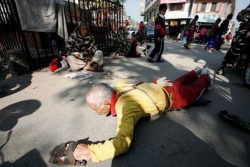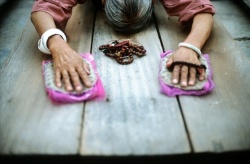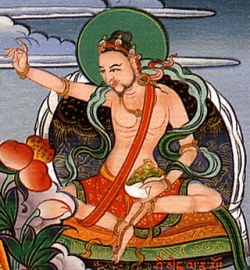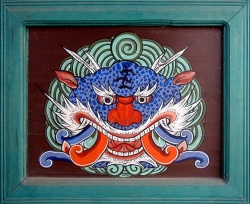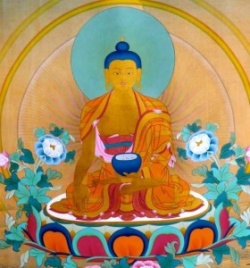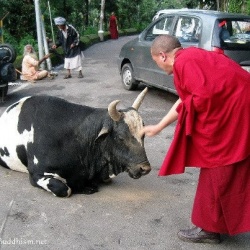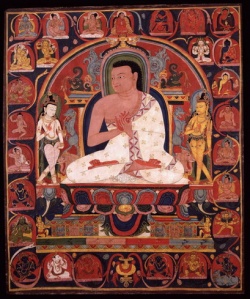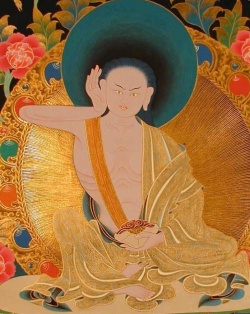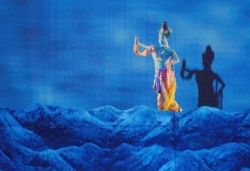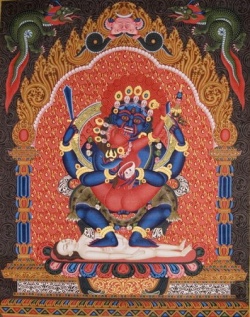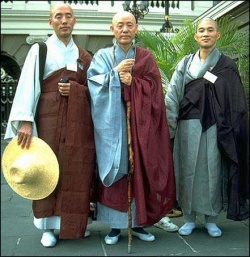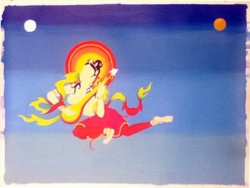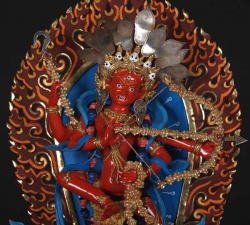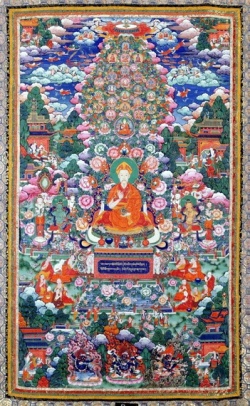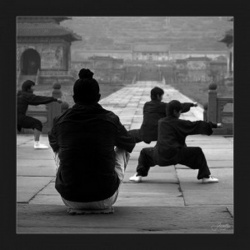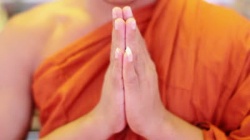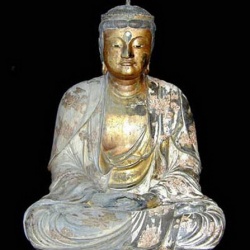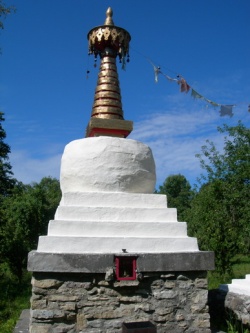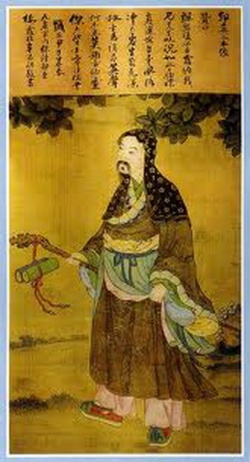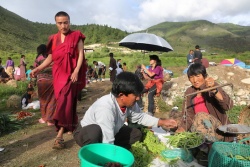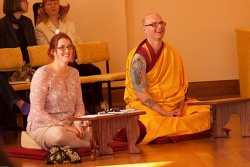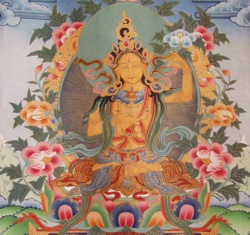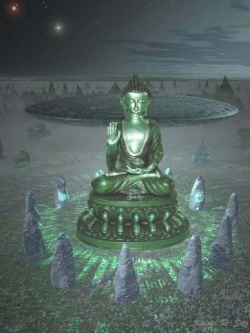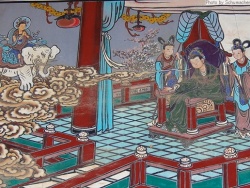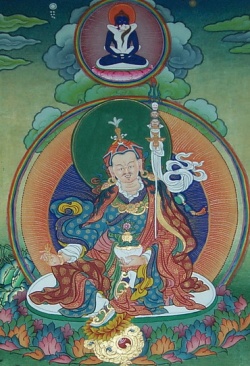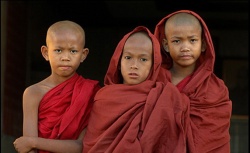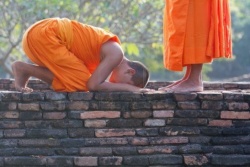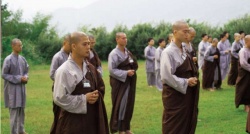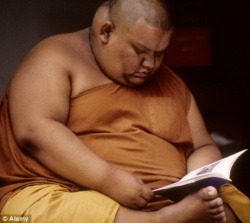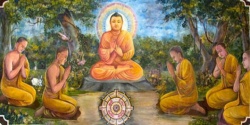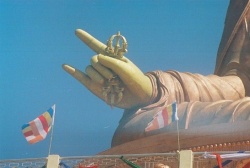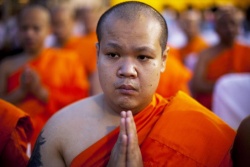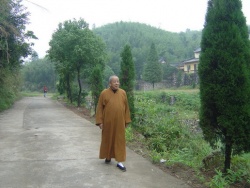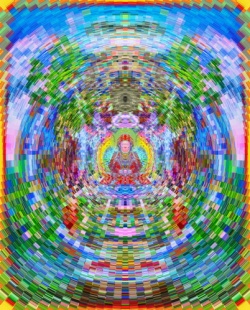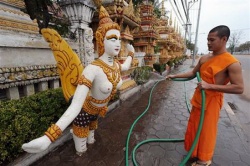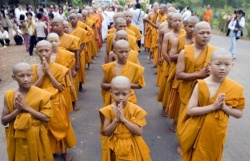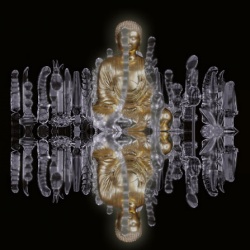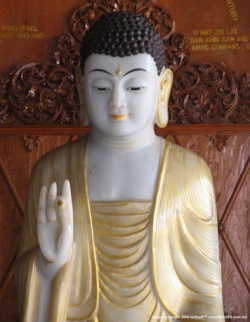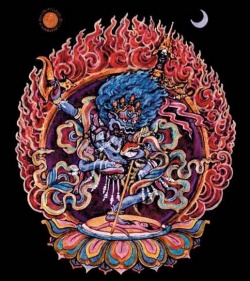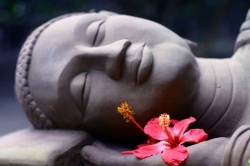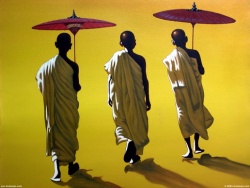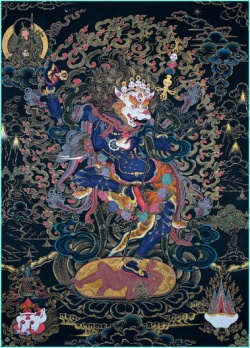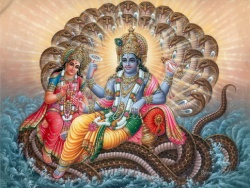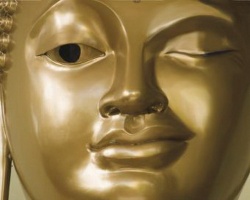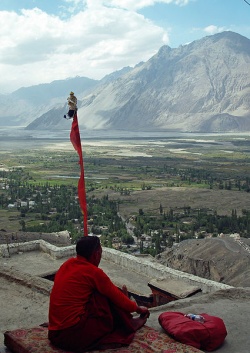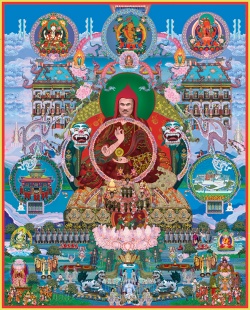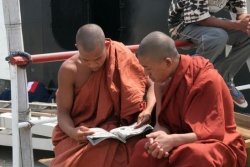92 pācittiyas
- See also :
- See also :
1st part, musāsāvāda
pācittiya 1
"sampajānamusāvāde pācittiyaṃ."
Not to lie. If a bhikkhu utters false speech whose nature he is aware of, he commits a pācittiya.
A bhikkhu who knows that what he has said is wrong only after having said it, if he doesn't rectify his speech, he immediately commits the pācittiya 1. The bhikkhu who gives erroneous talks, believing them to be right, does not commit any fault.
While asserting, with full knowledge of the facts, that something is true when it is not, or else that it is not true when it actually is, by making this wrong information known by means of body (gestures, hand writing) or speech, it is considered as a lie.
Note: This rule corresponds with the fourth of the ten precepts.
pācittiya 2
"omasavāde pācittiyaṃ."
Not to insult another bhikkhu. If, by means of abusive words, a bhikkhu verbally offends another bhikkhu, he commits a pācittiya.
pācittiya 3
"bhikkhupesuññe pācittiyaṃ."
Not to create disagreement between bhikkhus. If a bhikkhu deliberately provokes a disagreement between bhikkhus, he commits a pācittiya.
The simple fact of making a report of hostile talks can create a disagreement.
pācittiya 4
"yo pana bhikkhu anupasampannaṃ padaso dhammaṃ vāceyya, pācittiyaṃ."
Not to recite together with laymen, texts of dhamma in pāḷi. If a bhikkhu recites pāḷi texts taken from the tipiṭaka or authoritative commentaries on them, even short extracts, together with laymen or laywomen, sāmaṇeras or sīladharas, he commits a pācittiya.
By reciting together with such classes of people, texts in pāḷi or texts from dhamma in other languages, a bhikkhu does not commit any fault. By reciting together text from the dhamma in pāḷi with other bhikkhus or with some bhikkhunīs, a bhikkhu does not commit a fault.
pācittiya 5
"yo pana bhikkhu anupasampannena uttari dirattatirattaṃ sahaseyyaṃ kappeyya, pācittiyaṃ."
Not to spend the night under the same roof as the laity. If bhikkhu spends more than three nights under the same roof and between the same walls as a layman or a sāmaṇera, he commits a pācittiya.
In this context, when we speak about "spending the night", it is the simple fact of lying down at dawn time, - as soon as the first light of dawn appears in the sky once the night is over - which is taken into consideration. Thus, a bhikkhu who spends more than three nights with a layman, if he gets up before dawn by the fourth night, he does not commit a fault.
A bhikkhu commits the pācittiya 5 if he spends more than three nights under the same roof and between the same walls as a person who is not a bhikkhu or with an animal with which it is possible to commit the pārājika 1. If a bhikkhu spends more than three nights under the same roof but not between the same walls as a layman (that is to say in another room), he commits a dukkaṭa but not a pācittiya.
A bhikkhu who spends more than three nights in the same building as a layman, but who remains in a room that does not share a common entrance way with the one where the layman dwells (in such a way that if the layman wishes to enter the room of the bhikkhu, he is first compelled to proceed outside), does not commit the pācittiya 5.
pācittiya 6
"yo pana bhikkhu mātugāmena sahaseyyaṃ kappeyya, pācittiyaṃ."
Not to lie down in a building in which there is a woman. If a bhikkhu lies down in a building where there is at least one woman - under the same roof and between the same walls - he commits a pācittiya.
For the pācittiya 6 to be committed, a woman must also be lying down (with the head lying). For example, if a bhikkhu sleeps lying down in a room where there are several women who are all standing or seated without the head resting on the floor, he does not commit this pācittiya.
If a bhikkhu lies down under the same roof as a woman but not between the same walls - in a different room - he commits a dukkaṭa but not the pācittiya 6. If he lies down at an upper floor of the building, and the woman is at the ground floor and this floor does not communicate with the upper floors, he does not commit a fault. If this building has an inner staircase - which interconnects the two levels -, the bhikkhu commits the pācittiya 6 (except if he is in another room).
"Lying down" means to have the head resting; whether on the floor, a bed, or else a pillow, armrest, etc. The pācittiya 6 is committed every time the bhikkhu lies his head. If the head is not lying down, a bhikkhu can sleep seated with the head leaning, in the same room as a woman, without committing this pācittiya. Sick bhikkhus are not exempted from the pācittiya 6.
pācittiya 7
"yo pana bhikkhu mātugāmassa uttarichappañcavācāhi dhammaṃ deseyya aññatra viññunā purisaviggahena, pācittiyaṃ."
Not to teach to a woman more than six consecutive words of dhamma. If, not being in the presence of a man able to understand, a bhikkhu teaches a woman more than six consecutive words of dhamma (tipiṭaka or authoritative commentaries on them) in pāḷi, he commits a pācittiya.
If the bhikkhu uses another language, he can freely teach the dhamma to women. By pronouncing in pāḷi, the sentences of taking refuge in the triple gem or the precepts, there is no fault. The reason for this being that it was not meant to make known the points of the dhamma.
According to this rule, a series of words means a verse, for the texts composed in the form of stanzas. Concerning texts devoid of a particular structure, each word is considered as a continuation of the preceding one.
A bhikkhu, when in the presence of several women, can teach six consecutive words of dhamma to each one, even if the others listen. As soon as the bhikkhu or the woman changes his or her position, the bhikkhu can teach six supplementary continuations (to the same woman) without being at fault.
pācittiya 8
"yo pana bhikkhu anupasampannassa uttarimanussadhammaṃ āroceyya, bhūtasmiṃ pācittiyaṃ."
Not to announce to a layman a realisation that has been achieved. If a bhikkhu announces to a layman or to a sāmaṇera, a realisation partaking with a jhāna nature or with a stage of ariyā, and this realisation has genuinely been achieved, he commits a pācittiya.
On the other hand, a bhikkhu who makes such a declaration, while knowing it to be false, commits the pārājika 4. A bhikkhu must avoid making his attainments known, even to other bhikkhus. Apart from four exceptions when they can do so, ariyās never unveil their realisations:
- Under a violent threat.
- Undergoing an oppressive and virulent lack of respect.
- A t the time of passing away.
- To reveal it to his preceptor or to a fellow bhikkhu who does a similar practice.
pācittiya 9
"yo pana bhikkhu bhikkhussa duṭṭhullaṃ āpattiṃ anupasampannassa āroceyya aññatra bhikkhusammutiyā, pācittiyaṃ."
Not to denounce a saṃghādisesa to a layman. If, without permission from the saṃgha, a bhikkhu reveals to a layman or to a sāmaṇera a saṃghādisesa that another bhikkhu has committed, he commits a pācittiya.
To dissuade the bhikkhu who has committed a saṃghādisesa from doing it again, one or several bhikkhus could reach an agreement resulting from a meeting of the saṃgha, allowing them to openly announce this saṃghādisesa to the people. However, any bhikkhu can freely announce the saṃghādisesa committed by a bhikkhu to another bhikkhu or to a bhikkhunī.
By announcing to a layman or to a sāmaṇera that which the bhikkhu has committed without specifying what kind of fault is involved or by mentioning which category the fault being committed belongs to, without expressly specifying what was committed, a bhikkhu does not commit any fault.
pācittiya 10
"yo pana bhikkhu pathaviṃ khaṇeyya vā khaṇāpeyya vā pācittiyaṃ."
Not to dig or cause someone else to dig the earth. If a bhikkhu himself digs or causes someone else to dig for him some "real earth", he commits a pācittiya.
By digging, explosion, scratching, lighting a fire or by any other means whatsoever, a bhikkhu must, in no case at all, modify the earth in any shape whatsoever. Also, he cannot cause the earth to be dug by someone else by directly asking him to do so. However, he is authorised to make him indirectly understand, by telling him for example: "I inform you that there is some earth that needs to be moved."
Two types of earth are distinguished; the "real earth" and the "false earth". Earth that is on its original place is considered as the "real earth", and earth that has been moved is considered as the "false earth". When the latter has been humidified by four months of monsoon, it then becomes "real earth". A bhikkhu who digs or causes some "false earth" to be dug by someone else, does not commit any fault, whereas by digging or by causing some "real earth" to be dug by someone else, he commits the pācittiya 10.
The various qualities of earth are also taken into consideration. If the earth that is dug is situated in the depths or if it is some relatively pure or pure earth, the bhikkhu commits the pācittiya 10. However, if it concerns earth containing pebbles or fragments of pottery, the bhikkhu can dig or cause someone else to dig it without being at fault.
2nd part, bhūtagāma
pācittiya 11
"bhūtagāmapātabyatāya, pācittiyaṃ."
Not to destroy plants. If a bhikkhu destroys or causes someone else to destroy plants that already reached their growing stage or completed their growth, he commits a pācittiya.
However, a bhikkhu who destroys a germ (root, stem, joint, bud or a seed) commits a fault but not a pācittiya. Concerning moss, being neither endowed of a bud, nor of leaves, it is considered as a germ. If, at the same time a root or a bud have grown out, it is already considered as a plant (or tree). By destroying a plant (or a tree), a bhikkhu commits the pācittiya 11. If a bhikkhu accidentally destroys small plants, he does not commit any fault.
In order to consume one of these plants or seeds (fruits and vegetables containing edible grains, roots, leaves, sugar cane, etc.), the vinaya foresees a way to make them permitted. There are three ways to make a fruit (or another plant) authorised:
- Notch done with a nail.
- Marking by means of fire (or by cooking, etc.)
- Cutting with a knife.
In order to make the fruit permitted, a kappiya (hence the term), layman or sāmaṇera, by touching a fruit (or another plant) must first of all announce to a bhikkhu that this fruit is authorised and only after (or at the same time), he damages it by marking it with fire, a scratch with a nail, or even by peeling and by completely cutting it into slices, but this fruit should at least have a small notch (or a burn). If the fruit is cut before announcing that it is authorised, it is suggested to renotch it after this announcement.
Once the fruit is allowed, the kappiya offers it to the bhikkhu who must receive it (touching from the base) whilst the kappiya holds it, or else, by receiving it in the container in which it is, or perhaps on the table on which it is served.
When a bhikkhu is offered a non authorised fruit, he can request a kappiya to make it authorised by pronouncing the adequate formula, in pāḷi or in another language...
"kappiyaṃ karohi."
Please make this fruit authorised", "Could you make that this fruit become consumable", etc.
Before damaging the fruit (or by damaging it), the kappiya pronounces the adequate formula whether in pāḷi, or else in another language...
"kappiyaṃ bhante."
"Now being authorised, Venerable" or "You can eat it" or "It is ready to be consumed", etc.
If the fruits fit to be authorised are in large quantity, it is just sufficient to gather them in such a way that they all touch each other. Afterwards, by damaging one of these fruits, all the others are also made authorised.
If a non autorized fruit must be ground before being offered, as a matter of convenience, it is preferable that it is made authorised before grinding.
Once a fruit is made authorised, it remains as such forever. If an authorised fruit being offered to a bhikkhu is not eaten and the bhikkhu on purpose forsook it, this fruit can be re-offered to such or another bhikkhu another day. To that end, it doesn't need to be authorised a second time.
The fruits that need to be authorised by a kappiya are all those that contain edible seeds (strawberries, fresh peanuts, tomatoes...) or that can be damaged (grape, mandarins...) The cooked fruits in which the seeds are eaten no longer need to be authorised by a kappiya given the fact that the seeds are no longer fertile. The same applies to fruits whose seeds or grains are too young to be fertile.
The roots fit to give birth to a plant need a kappiya so as to be authorised (ginger, radish, carrots...)
The uncooked cereals also need a kappiya in order to be authorised (corn, wheat, millet, sunflower...)
pācittiya 12
"aññavādake, vihesake pācittiyaṃ."
Not to change the conversation when the saṃgha asks a question. If a bhikkhu bothers the community of the saṃgha, whether by giving a reply that does not correspond with the question being asked, or else by remaining silent, he commits a pācittiya.
It is suitable to utter a specific formula to the bhikkhu who replied in a diverted way or remained silent, while listening to the questions that were asked to him. If at the end of this reading, this bhikkhu does not give a convenient reply to the original question or remains silent, he commits the pācittiya 12.
pācittiya 13
"ujjhāpanake, khiyyanake, pācittiyaṃ."
Not to blame or slander a bhikkhu. If a bhikkhu utters blames or slanders against another bhikkhu, he commits a pācittiya.
A bhikkhu directly expressing criticism addressed to another bhikkhu or spreading slanders about him by telling others, are two ways to commit the pācittiya 13.
Only a bhikkhu assigned to a task (post, duty, etc.) by the saṃgha causes the pācittiya 13 to be committed by the bhikkhu who slanders him.
Of course, the bhikkhu who blames a corrupt bhikkhu does not commit any fault.
pācittiya 14
"yo pana bhikkhu saṃghikaṃ mañcaṃvā pīṭhaṃ vā bhisiṃ vā kocchaṃ vā ajjhokāse santha ritvā vā santha rāpetvā vā taṃ pakkamanto neva uddhareyya, na uddharāpeyya, anāpucchaṃ vā gaccheyya, pācittiyaṃ."
Not to leave a mattress or a chair outside without arranging it back suitably. If a bhikkhu installs or causes someone else to install outside a material that belongs to the saṃgha, worthy to be used for sleeping or sitting – such as a bed, a chair, a mattress or a mat –, and upon leaving this spot, he does not arrange this material back into its original place, nor makes or tells someone who is fit to arrange it back to do so, he commits a pācittiya.
pācittiya 15
"yo pana bhikkhu saṃghike vihāre seyyaṃ santha ritvā vā santha rāpetvā vā taṃ pakkamanto neva uddhareyya, na uddharāpeyya, anāpucchaṃ vā gaccheyya, pācittiyaṃ."
Not to leave a couch that has been moved in the monastery. If, in a monastery, a bhikkhu himself moves or causes someone else to move a couch (bed, mattress, etc.) and upon leaving, he does not arrange it back suitably, nor causes someone else to arrange it back, or tells anyone who is fit to arrange it back, he commits a pācittiya.
By leaving a couch in an area that is protected from termites and rain, a bhikkhu does not commit any fault.
pācittiya 16
"yo pana bhikkhu saṃghike vihāre jānaṃ pubbupagataṃ bhikkhuṃ anupakhajja seyyaṃ kappeyya "yassa sambādho bhavissati, so pakkamissatī" ti etadeva paccayaṃ karitvā anaññaṃ pācittiyaṃ."
Not to set a bhikkhu apart in order to make him leave. If, in a monastery belonging to the saṃgha, a bhikkhu sits or lies down on a place situated against another bhikkhu's spot in such a way that, by feeling uneasy owing to the lack of space, the latter leaves the place, he commits a pācittiya.
According to this rule, by any means whatsoever (lack of space, noise, smoke, etc.), a bhikkhu must in no case behave so that another bhikkhu, whoever he is, leaves his lodging spot, if the sole motive is to make him leave. However, under legitimate reasons, a bhikkhu can request other bhikkhus to move to another spot. However, there are three classes of bhikkhus to whom a bhikkhu can under no pretence make that request:
- A bhikkhu having more seniority than oneself.
- A sick bhikkhu (gilāna).
- A bhikkhu who is devoted to the saṃgha (by teaching the dhamma, by doing various kinds of works for the monastery or for bhikkhus, etc.)
pācittiya 17
"yo pana bhikkhu bhikkhuṃ kupito anattamano saṃghikā vihārā nikkaḍṭeyya vā nikkaḍṭāpeyya vā, pācittiyaṃ."
Not to expel a bhikkhu from a lodging belonging to the saṃgha. If a bhikkhu expels or causes someone else to expel a bhikkhu from a lodging place belonging to the saṃgha, he commits a pācittiya.
In the same way, if a bhikkhu causes another bhikkhu to be expelled from a lodging belonging to the saṃgha by winning the case in a court of law, he commits the pācittiya 17.
A bhikkhu does not commit any fault by expelling a bhikkhu - or a sāmaṇera - if the latter
is violent or desobedient. However, it is not allowed to expel this type of person from the monastery's compound. No fault is committed, by expelling a bhikkhu – or a sāmaṇera – if the latter behaves badly, provokes big conflicts or refuses to obey to his instructors or preceptor. It is also allowed to throw out the belongings of such people.
pācittiya 18
"yo pana bhikkhu saṃghike vihāre uparivehāsakuṭiyā āhaccapādakaṃ mañcaṃ vā pīṭhaṃvā abhinisīdeyya vā abhinipajjeyya vā, pācittiyaṃ."
Not to install oneself on a bed or a chair that is placed on a floor with broken planks. If a bhikkhu sits or lies down on a chair or a bed placed on the first floor of a house belonging to the saṃgha, and its floor shows holes opened to the lower floor - the planks not being completely installed - and this chair or this bed has removable legs or board, this bhikkhu commits a pācittiya.
This pācittiya is committed only if the four following factors apply:
- There are people on the flower floor.
- Each of these two floors has a height - from floor to ceiling - greater than that of a human being.
- The board of the bed (or legs of the chair) are not fixed up by means of pegs or anything else).
- The building belongs to the saṃgha.
pācittiya 19
"mahallakaṃ pana bhikkhunā vihāraṃ kārayamānena yāva dvārakosā aggaḷaṭṭhapanāya ālokasandhiparikammāya dvatticchadanassa pariyāyaṃ appaharite ṭhitena adhiṭṭhātabbaṃ. tatoce uttari apaharite pi ṭhito adhiṭṭhaheyya, pācittiyaṃ."
Not to build a roof having more than three layers. If a bhikkhu himself builds or causes someone else to build a roof containing more than three layers, he commits a pācittiya.
Note: This method of erecting a roof by means of several layers is typically Indian. Henceforth, methods of construction being utilised in other countries are not concerned by the pācittiya 19.
pācittiya 20
"yo pana bhikkhu jānaṃ sappāṇakaṃ udakaṃ tiṇaṃ vā mattikaṃ vā siñceyya vā siñcāpeyya vā, pācittiyaṃ."
Not to pour on the ground some water containing insects. If, knowing that there are insects or other worms in some water (living things that usually live in the water), a bhikkhu himself pours this water on the grass or on the ground, or causes someone else to pour it, he commits a pācittiya.
A bhikkhu must not pour on the ground any water containing beings that live in it. In order to spare their lives, this water must be poured on a spot where there is water propitious to these beings. Admittedly, it is improper to pour, in a pool or a river, water that contains insects that fell but cannot live in it (such as ants), no fault is being committed if throwing this water on the ground or the grass.
3th part, ovāda
pācittiya 21
"yo pana bhikkhu asammato bhikkhuniyo ovadeyya, pācittiyaṃ."
Not to teach bhikkhunīs without a permission taken from the saṃgha. If a bhikkhu teaches bhikkhunīs, regarding the kind of respect that they are supposed to show to the bhikkhus, without the permission from the saṃgha, he commits a pācittiya.
Only a bhikkhu having taken permission from the saṃgha and who fulfils the eight required characteristics can teach the dhamma to the bhikkhunīs.
These eight characteristics are as follows:
1) to respect the pātimokkha (to cultivate a pure sīla). 2) To have gained general knowledge of the tipiṭaka. 3) To have committed the pātimokkha by heart. 4) To express himself by means of suitable words and with a correct intonation (neutral). 5) To be appreciated by the saṃgha of the bhikkhunīs. 6) To be proficient in teaching dhamma to the bhikkhunīs. 7) Not to have, during his previous life as a layman, given (or received from them) loving caresses to some bhikkhunīs or to have had sexual intercourse with the sīladharas. 8) To have achieved a seniority of at least twenty vassas.
pācittiya 22
"sammato pi ce bhikkhu atthaṅgate sūriye bhikkhuniyo ovadeyya, pācittiyaṃ."
Not to teach the dhamma to the bhikkhunīs after nightfall. If a bhikkhu teaches bhikkhunīs after the sun sets, he commits a pācittiya.
pācittiya 23
"yo pana bhikkhu bhikkhunussayaṃ upasaṅkamitvā bhikkhuniyo ovadeyya aññtra samayā, pācittiyaṃ, tatthāyaṃ samayo, gilānā hoti bhikkhunī, ayaṃ tattha samayo."
Not to proceed to a monastery of bhikkhunīs in order to teach. If a bhikkhu proceeds a monastery of bhikkhunīs and he gives a teaching, he commits a pācittiya.
However, if a bhikkhunī is sick, a bhikkhu is authorised, with permission from the saṃgha, to proceed to her monastery in order to teach her. If a permission is taken from the saṃgha, he can also proceed there to report back what has been discussed during the uposatha concerning the bhikkhunīs.
pācittiya 24
"yo pana bhikkhu evaṃ vadeyya "āmisahetu therā bhikkhū bhikkhuniyo ovadantī" ti, pācittiyaṃ."
Not to accuse a bhikkhu to have taught bhikkhunīs so as to receive offerings. If a bhikkhu accuses a bhikkhu who gave teachings to the bhikkhunīs - with the permission of the saṃgha - to have done it in order to obtain material benefits, he commits a pācittiya.
Admittedly, by accusing a bhikkhu who gives a teaching to bhikkhunīs with the real aim to receive offerings, not fault is being committed.
pācittiya 25
"yo pana bhikkhu aññātikāya bhikkhuniyā cīvaraṃ dadeyya aññatra pārivattaka, pācittiyaṃ."
Not to give a robe to a bhikkhunī. Without the purpose of an exchange, if a bhikkhu gives a robe to a bhikkhunī who is not a relative of his, he commits a pācittiya.
pācittiya 26
"yo pana bhikkhu aññātikāya bhikkhuniyā cīvaraṃ sibbeyya vā sibbāpeyya vā, pācittiyaṃ."
Not to sew a robe for a bhikkhunī. If a bhikkhu himself sews or causes someone else to sew a robe for a bhikkhunī who is not relative of him, he commits a pācittiya.
By sewing or causing someone else to sew a robe meant to be offered to a bhikkhunī who is not a relative of his, a bhikkhu commits the pācittiya 26 for every completed sewing.
pācittiya 27
"yo pana bhikkhu bhikkhuniyā saddhiṃ saṃvidhāya ekakkha, namaggaṃ paṭipajjeyya antamaso gāmantarampi aññatra samayā, pācittiyaṃ. tatthāyaṃ samayo, satthagamanīyo hoti maggo, sāsaṅkasammato, sappaṭibhayo, ayaṃtattha samayo."
Not to plan a trip with a bhikkhunī. If bhikkhu plans to make a trip with a bhikkhunī and leaves at the same time as she does, even if he does not follow the same route as she does, he commits a pācittiya.
A bhikkhu is allowed to follow a route with a bhikkhunī only if nothing was planned in advance and if the laity joins the trip, or if there is a doubt concerning the safety of the trip or any other danger.
pācittiya 28
"yo pana bhikkhu bhikkhuniyā saddhiṃ saṃvidhāya ekaṃ nāvaṃ abhiruheyya uddhaṃgāminiṃvā adhogāminiṃ vā aññatra bhiriyaṃ taraṇāya, pācittiyaṃ."
Not to take a boat with a bhikkhunī. If after having planned it in advance, a bhikkhu takes a boat with a bhikkhunī by navigating on the sea, a lake or a river – in a direction either with or against the current – he commits a pācittiya.
However, a bhikkhu is allowed to cross a river with a bhikkhunī in order to reach the other shore.
pācittiya 29
"yo pana bhikkhu jānaṃ bhikkhuparipācitaṃ piṇḍapātaṃ bhuñjeyya aññatra pubbe gihisamārambhā, pācittiyaṃ."
Not to eat food prepared by a bhikkhunī. If a bhikkhu consumes some food that a bhikkhunī has incited to offer, he commits a pācittiya.
In case the person offering the food might be a relative (refer to the list found in nissaggiya 4) of the bhikkhu or the bhikkhunī, the bhikkhu does not commit any fault by eating it if this particular bhikkhunī made it offered to him.
pācittiya 30
"yo pana bhikkhu bhikkhuniyā saddhiṃ eko ekāya raho nissajjaṃ kappeyya, pācittiyaṃ."
Not to sit with a bhikkhunī in a remote spot. If a bhikkhu and a bhikkhunī, both isolate themselves together in a place where nobody can hear what they say, the bhikkhu commits a pācittiya.
Please also refer to the aniyata 1 and 2.
4th part, āvasathaninḍa
pācittiya 31
"agilānena bhikkhunā eko āvasathapiṇḍā bhuñjitabbo. tato ce uttari bhuñjeyya, pācittiyaṃ."
Not to eat at the same spot twice consecutively food destined for travelling guests. If a bhikkhu who is not sick, after having eaten a meal offered at an inn that prepares meals for travellers, eats a meal there twice consecutively, he commits a pācittiya.
A sick bhikkhu can eat there several days consecutively without committing any fault. In this case, a bhikkhu is considered sick if, after having walked a distance equal to half a day's walk – between five and six kilometres (3 to 4 miles) – he is no longer physically able to continue.
pācittiya 32
"gaṇabhojane aññatra samayā pācittiyaṃ. tatthāyaṃ samayo, gilānasamayo cīvaradānasamayo cīvarakārasayo addhānagamanasamayo nāva, bhi ruhanasamayo mahāsamayo samaṇabhattasamayo, ayaṃ tattha samayo."
Not to eat several times food being incorrectly asked for. If a bhikkhu eats one of the "five sorts of food" – incorrectly asked for, he commits a pācittiya at every mouthful.
Such food can only be consumed if:
The bhikkhu is ill; the bhikkhu has entered the period when he is allowed to ask for a robe or to make one; the bhikkhu performs a long journey (one and a half day walk, between five and six kilometres); the bhikkhu goes on a boat trip; there are many bhikkhus in the same place (and these do not succeed in obtaining sufficient food); a bhikkhu receives this food from another bhikkhu.
The correct and incorrect way to offer or ask for food
If some dāyakas go to four or more bhikkhus, and invite them for a meal by using an appropriate language such as: "Venerables, please accept an invitation for a meal", this indeed is the proper way. But, if the dāyakas use an incorrect language such as: "Hey! Come and binge at my house", it is the improper way. There are words, in the pāḷi vocabulary and in certain Asian languages, which are utilised exclusively while addressing bhikkhus. Imagine that in a country where the saṃgha does prevail to say "eat", one uses the verb "to eat" meant for the laity and the verb "to feed" meant for bhikkhus. In this case, the verb "to eat" is not impolite at all while dealing with the laity. However, the same term becomes rude if it is used for a bhikkhu. It is then considered an incorrect way to invite the bhikkhus.
A group of four bhikkhus (or more) address dāyakas in that fashion: "Please offer rice to all four (or more).of us. " Or else, they express that request in this way, each separately to the same dāyakas: "Offer us rice." Then, they accept this food and eat it together. By accepting and eating this food, they commit the pācittiya 32.
The essential point is the acceptance of the food. For this reason, four or more bhikkhus who accept some food improperly obtained, even separately, one after another (or two by two, etc.) commit this fault by eating it.
The seven exceptions
There are seven exceptions by which a bhikkhu can eat some food improperly accepted by several bhikkhus, without committing any fault:
- The bhikkhu is sick or hurt in a way that he is no longer able to go and find food on his own.
- The bhikkhu has entered the period of the robe (materials' searches and robe's making, please refer to nissaggiya 3) and no benefits are obtained from the kathina.
- The bhikkhu has entered the period of the robe and the benefits of the kathina are obtained.
- Some bhikkhus gather in large number to sew or to dye the robes.
- The bhikkhu performs (or plans to perform) a trip equivalent to at least half a day's walk - either five and six kilometers (three to four miles).
- Some bhikkhus do not succeed in getting sufficient food while going for alms in a village or a town.
- The person who offers this food by using an inappropriate language is a bhikkhu, a bhikkhunī or a sāmaṇera.
The five kinds of food
- The seven kinds of rice (being already cooked).
- Flours and cakes or noodles, made with the seven kinds of rice.
- All kinds of cakes or noodles made from barley.
- Fish (flesh of aquatic beings).
- Meat (meat of beings living on earth).
pācittiya 33
"parampabhojane aññtra samayā pācittiyaṃ. tatthāyaṃ samayo, gilānasamayo cīvaradānasamayo cīvarakārasamayo, ayaṃ tattha samayo."
Not to go to eat at another place after having already been invited somewhere. If a bhikkhu who has been invited at a time suitable for a meal, without eating on that invitation (or eating only a little), goes somewhere else to eat food from another person, he commits a pācittiya.
Only a sick bhikkhus or those in the robes period (search of cloth and sewing) are authorised to eat other food after having been previously invited for a meal.
Unless it concerns fixed dates, if a bhikkhu is invited to a meal by several persons from different places, he must first attend the invitation that the first person extended, next the second, and so-on.
A bhikkhu who is not ill or in the robes period and who, without going or deferring for later an invitation for a meal, attends another invitation to a meal received after the preceding one, commits the pācittiya 33 with each mouthful (unless he has previously transferred the first invitation).
The way to transfer an invitation
The bhikkhu who is invited at a first dāyaka, and then at a second, and wishes for some reason to attend the invitation by the second without going to that of the first can, to be free from fault, transfer that first invitation to another bhikkhu, a bhikkhunī or a sāmaṇera. For that, he proceeds to a bhikkhu, a bhikkhunī or a sāmaṇera and says - in pāḷi or in another language:
"mahyaṃ bhattapaccāsaṃ tuhyaṃ dammi"
"I hand down to you the invitation for the meal at the whereabouts of the first dāyaka who invited me."
Then, the bhikkhu can freely go and eat at the whereabouts of the first dāyaka who gave the second invitation without committing any fault, even if the person having received the invitation does not go. However, it is proper that the bhikkhu who received the first invitation informs or makes someone else inform the dāyaka in whose whereabouts the invitation will not take place. If he wishes to proceed to a third invitation without answering to the second, it is appropriate that he does the same for the second invitation.
pācittiya 34
"bhikkhuṃ paneva kulaṃ upagataṃ pūvehi vā mantehi vā abhihaṭṭhuṃ pavāreyya, ākaṅkhamānena bhikkhunā dvattipattapūrā paṭiggahetabbā. tato ce uttari paṭiggaṇheyya, pācittiyaṃ. dvattipattapūrapaṭaggahetabba. tato ce uttaripaṭiggahṇeyya, pācittiyaṃ. dvettipattapūrepaṭiggahetvā tato nīharitvā bhikkhūhi saddhiṃsaṃvibhajatadhabhabbaṃ ayaṃtattha sāmīci."
Not to accept more than the equivalent of three bowls of pastries if they were not originally make for the bhikkhu. A bhikkhu can accept up to two or three bowls of confectionaries. If a bhikkhu accepts more pastries - even those eaten away by mice - in a house where two or three bowls of pastries have already been offered to some bhikkhus, he commits a pācittiya.
Note: In this context, the term "pastries " encompasses any food made of dough (bread, pancakes, cakes, etc.)
By leaving a house after having accepted a bowl full with pastries, if a bhikkhu catches a glimpse of another bhikkhu, he must tell him: "I just received a bowl full with pastries". By leaving this house after having accepted on his turn a full bowl full with pastries, if the second bhikkhu catches a glimpse of a third, he must tell him: "A bhikkhu has already received a bowl full with pastries and so did I". By leaving this house after having accepted on his turn a bowl full with pastries, if this third bhikkhu catches a glimpse of another, he must tell him: "Two bhikkhus and myself have each received a bowl full with pastries. Do accept no more of them".
If the first bhikkhu of the day to stand in front of a house, receives the equivalent of two or three bowls of pastries at once, he must inform the other possible bhikkhus who are likely to show up in front of the same house.
A bhikkhu who has received the equivalent of more than one bowl of pastries can keep only one for himself and must give the remaining bowl(s) to other bhikkhus. Also the bhikkhu who is supposed to share the pastries received must not do it with the bhikkhus whom he himself chose, but with those who are the closest to the house where the extra rations were received. The bhikkhu who does not share what he owes, commits a dukkaṭa.
However, if a bhikkhu who has received the equivalent of three bowls of pastries, does not commit any fault if he accepts some again, from a dāyaka who has got some extra and who has no more cakes to prepare.
pācittiya 35
"yo pana bhikkhu buttāvī pavārito anatirittaṃ khādanīyaṃ vā bojanīyaṃ vā khādeyya vā buñjeyya vā, pācittiaṃ."
To eat no longer once we have left our spot, after having made understood that we have finished our meal or refused to be served again. After having started to eat, if a bhikkhu who has performed a pavārito - showing that he has finished to eat - keeps on eating elsewhere, he commits a pācittiya.
By taking a meal when the food is again proposed, if a bhikkhu having crossed hands, makes a gesture with them to mean a refusal, declares: "I have enough of it"; "That's enough"; "I have finished eating", expresses in any way a refusal to be served again, whether by means of gestures or else by means of speech, he performs a pavārito (a refusal to be served again).
The characteristics of the pavārito
- The bhikkhu is eating at least one of the five sorts of staple foods.
- A person, whether a bhikkhu or not, proposes to serve, or to bring – after the beginning of the meal – to a bhikkhu one of the five kinds of food.
- The bhikkhu eats one of the five kinds of foods while some is brought to him and this one also belongs to one of the five kinds of staple foods.
- The person who brings the food is situated at least at a two cubits and half length - about 120 centimetres (40 inches) - from the bhikkhu.
- The bhikkhu refuses to receive more food, either by means of body (gestures), or by means of speech.
As soon as the five characteristics come together, the bhikkhu performs a pavārito.
The case when the pavārito is not performed
The person bringing food, who is about to serve the bhikkhu again, is situated at a distance measuring more than two and a half lengths – about 120 centimetres (40 inches) – away from this bhikkhu.
The person proposes food to the bhikkhu when the container of the food he/she is holding is situated beyond a distance of two and a half cubits length.
The person verbally proposes food to the bhikkhu, while being situated at least two and a half cubits length away from him, when in fact there is no food in the hand (nor in the container which he/she holds).
Other casual prospects
If the bhikkhu who has performed a pavārito, without doing atirita, takes food other than from the left overs of a bhikkhu gilāna, he commits the pācittiya 35.
A bhikkhu who has performed a pavārito, can without committing any fault, keep on eating as long as he does not change his position and the - solar - noon has not elapsed. By changing his position after having performed a pavārito, a bhikkhu who eats the leftovers of a bhikkhu gilāna or who eats after having performed atirita, does not commit any fault. If a bhikkhu, having performed a pavārito, eats food - which is not taken from the leftovers of a bhikkhu gilāna - without having proceeded to an atirita, he commits the pācittiya 35.
By making a trace with the fingers (or by means of a spoon, a piece of bread, etc.) when the contents of his bowl (or plate) is about to be fully consumed, he performs a pavārito. A visible trace of wiping inside of the bowl (or another eating bowl) is considered as a way to make others understand that one has finished eating.
On the other hand, if it concerns liquid food, such as soup for instance, the pavārito cannot be performed through wiping by means of fingers, as there will be not visible traces.
A pavārito doesn't take place if the foods proposed when the bhikkhu has refused to be served again are the following: Popped rice; rice balls; rice pastries; milk and dairy products; yoghurt; butter; oil; fat; pastries containing neither beef nor fish; rice grilled - but not cooked; meal of grilled rice; young rice; other foods made of rice; bamboo fruit; soup or broth cooked with meat and fish - which were taken out; meat juice, fish juice; all kinds of fruits; roots, in whatever way they are cooked (boiled, stewed, fried, etc.)
By refusing to be served a meal containing one of the forbidden "ten meats", a bhikkhu does not perform a pavārito. In the same way, if it concerns food that has been obtained for medical care, or out of veneration inspired by erroneous declarations of success (in reaching the state of ariyā, jhāna, etc.), or from buying or bartering, a bhikkhu does not commit a pavārito by refusing it.
As has been described, if a bhikkhu makes someone understand that he no longer wishes to be served, that he has enough, whether by means of a bodily gesture, speech or both at once, he performs a pavārito. After having changed his position, if this bhikkhu needs to eat again, he must first of all receive atirita food, as indicated by the procedure stipulated in the vinaya.
The way to perform atirita
On the occasion when a bhikkhu who has refused to be served again, wishes to eat again – before noon –, he must himself put food (including which has already been offered, of course) in a bowl, a pot or any other container, and then request another bhikkhu to offer it again to him – in hands – or a kappiya to hand it over to another bhikkhu so that he can then re-offer it to the bhikkhu wishing to eat again. If the bhikkhu who is likely to re-offer this food is situated at a distance over two and a half cubits length – about 120 centimetres –, it is advisable to come closer and ask him. Then, he hands the bowl to him while saying the following formula:
"atirittaṃ karotha bhante".
"Venerable(s), please make – from this bowl of food – leftovers".
After the bhikkhu (receiving the request) has eaten or not, a bit of food from the bowl that the other bhikkhu gave to him, he says in – in Pali – to the latter:
"alametaṃ sambbaṃ".
"I have finished eating this food (that which is in the handed bowl)".
Once this procedure is being completed, the bhikkhu can then eat again. If it concerns the leftovers of a bhikkhu gilāna, it is not necessary to ask him (as indicated above) to eat it.
The seven factors of the atirita procedure
To make sure that the atirita procedure is valid, seven factors should come into being:
- The food that a bhikkhu requests to be remitted to him, must have been previously offered. The food in question should be a proper one. As a consequence, it should not be one of the forbidden "ten meats", neither food having been obtained on medical grounds or else owing to veneration stirred up by false declarations of realisations, nor bought or exchanged.
- The food has conveniently been offered - given in hands the very same day.
- The container is presented before the bhikkhu likely to re-offer the food by slightly tilting it in his direction.
- The bhikkhu asking to eat again follows the procedure of this demand by stretching out the container in the hands and placing himself at a distance under two and a half cubits length.
- The bhikkhu likely to re-offer food must have already eaten before this - even if it is a small quantity of food.
- If the bhikkhu likely to re-offer the food himself performs a pavārito, he must not have changed his position. (If he has not performed a pavārito, this factor is needed even if he left his place meanwhile).
- The bhikkhu likely to re-offer food, whether he has or not eaten a bit of food from the container held by the bhikkhu wishing to eat again, declares:
"alametaṃ sambbaṃ"
"I have finished eating this food" or "I have had enough".
As soon as these seven factors are met, the food returned to a bhikkhu not having performed the pavārito, is considered as leftovers from this moment. The bhikkhu wishing to eat again can then do so.
The simple way
It is difficult to find a way to perform atirita, it is always possible to ask for leftovers from a bhikkhu gilāna. To do so, one asks him if he does not want to finish his meal. If he answers: "I can no longer eat" or "I have had enough", it is sufficient to take back the leftovers to keep on eating without an atirita being needed and without committing any fault.
By doing so, it is first of all advisable to come near a bhikkhu gilāna. This latter will probably give an invitation to eat with him. At this moment, one must tell him: "Only you Venerable, please eat!" If he answers that he has had enough, and that he no longer wishes to eat, the bhikkhu who has performed a pavārito can then start to consume it.
The way to avoid the pavārito
In all cases, the best thing to do will naturally be to avoid performed a pavārito. Henceforth, if a bhikkhu wishes not to be served for a while, instead of saying: "I have had enough" or to make a hand gesture meaning a refusal, he must, for example, tell something like:
"That is fine for the time being" or "If it is needed, I will let you know" (in this second case, it means to be served a meal that has already been offered).
Another way lies in telling the person who offers a meal and comes close to serve:
"Once it is offered, just leave it".
Without touching a plate, if a layman verbally proposes to a bhikkhu to serve himself again a dish being already offered, the latter should simply remain silent or say something like, for example: "That's fine, I will serve myself if needed", he does not perform any pavārito. However, he performs one if he replies that he has had enough, that he has been served.
pācittiya 36
"yo pana bhikkhu bhikkhuṃ buttāviṃ pavāritaṃ anatirittena khādanīyo vā bojanīyena vā abhihaṭṭhuṃ pavāreyya "handa bhikkhu khāda vā bhuñja vā" ti jānaṃ āyādanā-pekkho, bhuttasmiṃ pācittiaṃ."
Not to incite another bhikkhu to eat elsewhere after having made him understood that he has finished his meal or refused to be served again. Knowing that a bhikkhu has performed a pavārito, if another bhikkhu manages so that the first one commits a fault, by proposing him food before he has performed the atirita, or some food that is not the leftovers of a bhikkhu gilāna (sick), he commits a dukkaṭa.
If a bhikkhu having accepted this food, eats it, he commits a dukkaṭa at every mouthful. Once he has finished eating, the bhikkhu having proposed this food commits the pācittiya 36.
pācittiya 37
"yo pana bhikkhu vikāle khādanīyaṃ bojanīyaṃ vā khādeyya vā bhuñjeyya vā, pācittiaṃ."
Not to consume solid foods between noon and the following dawn. A bhikkhu who consumes food after - solar - noon commits a pācittiya.
The period starting from dawn and ending at noon (from the first light of the day in the sky, until the sun is half-way between the rising and the setting) is called "kāla", which is translated by "correct time". The corresponding period (starting from noon until dawn) is called "vikāla", which is translated by "incorrect time". During this "incorrect" period, a bhikkhu is supposed not to consume one of the "five sorts of foods" (please refer to the end of pācittiya 32), neither cakes, nor fruits of any kind whatsoever. In fact, none of the existing solid foods. During the " vikāla", if there are no health problems, it is also convenient not to take medicines.
In case of intense hunger, a bhikkhu is authorised to drink some sugar palms fermented liquid, liquid sugar, various kinds sorts of properly filtered juices, or even infusions made from elements which are not consumed in the form of solids in the concerned region. For example: A camomile tea can be drunk in the afternoon because the flower of the camomile cannot be eaten, but a mint tea cannot be drunk at afternoon time because the leaves of the mint are edible. On the other hand, tea can be drunk in certain countries and not in others, because the tea leaves can be eaten in salads in certain countries.
Foods such as cow milk, soya milk, coffee or chocolate drinks, are forbidden at afternoon time.
In case of absence of hunger, it is more suitable not to drink the authorised drinks. A simple thirst must be quenched with water.
A bhikkhu who is not ill must in no case eat solid food between noon and dawn. If a bhikkhu is very hungry or lacks energy, one can offer him a solid food, like hard molasses, he can if it is necessary suck it but in no case bite it.
Note: In the context of the vinaya, "noon" always refers to solar noon. Clocks are recent invention and the time zone is not very accurate, because time can be the same from one point and another, separated from west to east by a distance of a thousand kilometers (750 miles), whereas nearly thirty seven "solar" minutes separate the two points.
In this rule, there are four allowed periods, (kālika) depending on the type of foods being taken.
The four kālika
yāva kālika
Period starting from dawn to noon, during which all foods can be accepted and eaten, apart from the forbidden "ten kinds of meats".
The 10 forbidden meats are listed as follows:
human flesh, dog, horse, elephant, leopard, tiger, lion, bear, hyena and snake.
yāma kālika
Period starting from dawn to the following dawn, during which all the "authorised drinks" (see below) can be accepted and consumed. Example of non-authorised drinks:
alcoholic drinks - whatever the percentage; milk (considered to belong to the the same category as a solid food, because it is nourishing); juice or the concocted drinks obtained from foods which are eaten in the concerned areas.
The drinks being authorised - at all times
Properly filtered, save a few exceptions (see the following paragraph), all fruit juices are authorised.
The non authorised juices
The juices of the seven sorts of rice; cucumber; peas; and all sorts of juices concocted from cooked leaves.
The types of foods from which it is suitable to prepare a drink.
Fruits' leftovers; the fruits being already touched; the drinks made from leaves.
sattāha kālika
Period of seven days, during which the following food items can be accepted and consumed (the first day is counted from dawn on the day of offerings; the last day meaning the end of the seventh following dawn, following the time of the offering):
Butter; fat; oil; honey; molasses; liquid sugar and mixture of medicines made of the elements previously mentioned.
Please also refer to nissaggiya 23.
yāvajīvika kālika
There are two things that can be accepted, kept as long as life endures and consumed, without any restraint:
Water and medicines.If a health problem requires it, any medicinal food or medicine can be stored for life, without needing to perform a re-offering.
Those that can be considered as medicinal foods are the following elements, provided they are not culinary stuffs:
Roots, stems, timber hitches, barks, rich substances (yolk, palms heart, etc.), diluted substances, such as an egg white, fruits, shoots, leaves and buds. (Pepper, ginseng, ginger and liquorice, etc.)
Note: This rule corresponds to the sixth of the ten precepts.
See also: The food.
pācittiya 38
"yo pana bhikkhu sannidhikāramaṃ khādanīyaṃ bojanīyaṃ vā khādeyya vā bhuñjeyya vā, pācittiaṃ."
Not to store food at afternoon time. A bhikkhu who consumes food, or a drink, after having kept it for a period exceeding a day after it was offered, commits the pācittiya 38 (food can be re-offered to a bhikkhu only if it has been abandoned the preceding night). All foods become "stored food" at dawn in the morning following the offering.
In all cases, food cannot be stored at afternoon time, nor can it be accepted. A bhikkhu who does not respect this rule commits a dukkaṭa. If a layman offers food to a bhikkhu during the afternoon, it is advised to the latter to inform the former that it is not possible for him to accept food in the afternoon. If the layman is not in the position to come back the next morning or a subsequent one, or if no other layman or sāmaṇera is present, the bhikkhu can at least propose to him to leave the food on this very spot, without a bhikkhu taking it in hands. It can then get it re-offered to him on the following day.
After having been offered to a bhikkhu, a food that has been abandoned to the laity or to the sāmaṇera, cannot either be taken back or stored by a bhikkhu, unless it has been re-offered. In this case, a bhikkhu cannot accept such a food if a layman, or a sāmaṇera, on his own proposes it to him, without having had to ask for it, even if it concerns a person who would have requested him to ask for it.
Provided it wasn't kept beyond the occurrence of dawn, some food already offered to one or several bhikkhus can once more be offered and consumed the following day.
When the bowl is badly cleaned, some marks remain, such as oil or sauce. If it is cracked, some food particles could permeate the holes or the cracks. By eating rice which is impregnated - even if it is only a small particle - by oil which has leaked through the cracks of the bowl on the previous day, a bhikkhu commits the pācittiya 38. For that reason, one should always properly clean the bowl (and all the utensils with which one eats) to make sure that no food remnant is left. However, if a bhikkhu isn't in the position to fill up the cracks or splits of the bowl in which he eats, he must abandon it. (refer to nissaggiya 22).
pācittiya 39
"yāni kho pana tāni paṇītabhojanāni, seyyathidaṃ, sappi navanītaṃ telaṃ madhu phāṇitaṃ maccho maṃsaṃ khīraṃ dadhi, yo pana bhikkhu evarūpāni paṇītabhojanāni agilāno atthāya viññāpetvā bhuñjeyya, pācittiaṃ."
Not to ask for food of superior quality for oneself. By any means whatsoever, except for solving a health problem, if a bhikkhu asks for himself, from some people who are not relatives of his or who haven't invited him, for one of the nine following foods of higher quality (paṇītabhojana) or a dish containing one of these foods, he commits a pācittiya: Butter; oil; fat; honey; molasses; fish; beef meat; milk; curdled milk.
It is not proper, on a bhikkhu's side, to express preferences. If he asks (or makes someone ask) for specific food items (even if they are apart from the "superior quality"), he also commits the pācittiya 39.
pācittiya 40
" yo pana bhikkhu adinnaṃ mukhadvāraṃ āhāraṃ āhareyya aññatra udakadanta ponā, pācittiaṃ."
Not to eat food which has not been offered and given in hands. Except for water (unless it is bottle put on sale) and a stick of "tooth brush" (in certain areas and epochs, a kind of wooden stick was utilized as a tooth brush, by fringing out the edges), if a bhikkhu on purpose inserts in his mouth, any type of food or drink, without having it been correctly offered to one or several members of the saṃgha, on a layman's behalf, from a sāmaṇera, an animal or a deva, it entails a pācittiya. In the pārājika 2, a thing belonging to someone, which has not been given by the owner is called: "adinna". In this rule also, food that has not been offered by the owner (or by a person who is in charge to do so) is called: "adinna".
To offer food to the saṃgha or to re-offer food already belonging to the saṃgha, five conditions must compulsorily be fulfilled so that a "correct offering" could take place...
The five required conditions for a correct offering:
- The offered object must be remitted to the bhikkhu face to face, in hands, and the donor - if he is not a bhikkhu - must bow slightly.
- The donor does perform the offering only by means of one or both hands, the bhikkhu receives only by means of one or both hands, and the two persons are separated from one another by a distance measuring about two and a half cubit lengths.
- The offered object and the container holding it (bowl, plate, pot, etc.) or the thing on which it is placed (tray, table, stool, etc.) and which is to be remitted in the hands of a bhikkhu can be carried or lifted by a man of normal anatomical complexion.
- The offering can be performed according to one of the three following ways:
- The donor is in direct physical contact with the container of the offering that he directly hands over to the bhikkhu.
- The donor is in direct physical contact with the offering that he directly hands over to the bhikkhu: bowl, plate, ladle, tray, table (or what is contained in the offering, etc., all should be carried together or raised at the same time as the moment of the offering).
- The donor gives or organises a donation to the bhikkhu.
- The offering can be accepted according to one of the two following ways:
An offering can only be valid if one of these five conditions are respected. If a layman touches or serves a meal which has been offered beforehand to the sangha, the bhikkhu can continue to serve the food as long as the layman has not considered it as his meal.
Note: As soon as it does not concern food, if an object is fixed or too heavy to be carried (tree, monastery, etc.), it can simply be offered with the help of speech. It is however preferable to offer household objects to the saṃgha rather than to one or even to several particular bhikkhu. In the case of a fruit tree offered to one or several members of the saṃgha, no bhikkhu will be authorised to pick up fruits, not even those which has fallen down. They should ask a kappiya to offer them with their own hands.
The incorrect way to offer
By grasping an object that one cannot move, such as heavy tile, a tree, a pole planted in the ground, a heavy table, a sealed furniture, etc. to offer one or several of the objects posed or hung above, this offering cannot be accepted.
If it concerns a leaf, a flower, a fruit or a branch, not taken from a living tree, this offering cannot be accepted.
If the food is placed on small pieces of leaves to be remitted in the hands of a bhikkhu, this offering cannot be accepted.
Even lifted by several persons, if it concerns a table which a man of normal corpulence is unable to lift, this offering cannot be accepted by lifting the table. In this case, it is suitable to offer the plates one by one.
If a container holding food is too heavy – like a big cooking pot – for only one person to lift, the offering cannot be accepted.
The six ways to break the validity of an offering
Whether concerning food or not, for certain reasons, the offerings can loose their validity. A case where an offering has lost its validity requires to be re-offered before being again used or eaten. Here are the six ways to break the validity of an offering:
The passage from the status of bhikkhu to that of bhikkhunī, because of a natural change in sex (probability nearly negligible).Abandon, with conscience, with the help of (gestures, speech, etc.) thoughts, or two at the same time, without the beneficiary – of this abandonment – being known.
Abandon, by offering donations to a layman, to a sāmaṇera, to an animal or to a deva.
Things that do not need to be offered to be used as consumables
Clean water. Water which is mixed with whatsoever can be drunk without being the subject of an offering. Not to offer muddy water, or water containing impurities, or other elements extraneous to water, which should be carefully filtered before being drunk.
Hot water (or warm) can be drunk without being the subject of an offering on the condition that it is not directly heated by a layman or a sāmaṇera: Water heated by being near a source of heat – sun, fire or a radiator; hot water from the tap; water heated by a bhikkhu.
The residual food stuck – by lack of attention – between the teeth can be swallowed without being re-offered. A bhikkhu who eats something that has accidentally fallen into the mouth does not commit any fault. If, while brushing the teeth, a particle of food falls down, it is necessary for it to be re-offered before being eaten.Substances coming out from all the orifices of the body. If nasal mucus manages to enter into the mouth before being stopped and it is swallowed without having been offered, there is no fault. If the mucus is recuperated before going in the mouth, it must be offered before eating it. It is the same for all the substances coming out from all the orifices of the body (excretion from the eyes, substance from the ears, tears, the salt in the sweat, excrements, urine, etc.) If a bhikkhu absorbs one of these substances without being offered, he does not commit any fault, unless they are still attached to the body at the moment of their absorption (pending, stuck, running on the skin, etc.) However, if one of them is separated from the body, it cannot be consumed after having been offered.
The way to measure the distance
In accordance with this rule, one must recall that the distance between the donor and the bhikkhu receiving an offering must not exceed a distance of two and a half cubits, about 120 centimetres (40 inches). This distance must be taken into consideration, from the bhikkhu, starting from: The back if he is seated; the back of the heals if he is standing; the sides upright - the most far away - if he is lying down, the head and the back opposite the head if he is lying on the stomach.
If it concerns to take into consideration this "distance of respect" starting from the part of the body that is furthest, and with the head a little bit straight. The distance must be counted from the bhikkhu to the person making the offerings (or vice-versa) by taking into consideration the same distances, according to the position that he occupies.
5th part, acelaka
pācittiya 41
"yo pana bhikkhu acelakassa vā paribbājakassa vā pāribbājakāya vā sahatthā khādanīyaṃ vā bhojanīyaṃ vā dadeyya, pācittiaṃ."
Not to give food to naked ascetics or other persons clinging to erroneous views. If a bhikkhu gives food to such persons with his own hands, this entails a pācittiya.
By giving products that are not foodstuffs to those persons (oil / ointments to be applied on the skin, soap, etc.), a bhikkhu does not commit an offence. Similarly, if a bhikkhu places a pot containing food in front of those persons telling them to take whatever they want from it, but without offering it from his own hands, he does not commit an offence.
pācittiya 42
"yo pana bhikkhu bhikkhuṃ "ehāvuso, gāmaṃ vā nigamaṃ vā piṇḍāya pavisissāmā" ti tassa dāpetvā vā adāpetvā vā uyyojeyya "gacchāvuso, na me tayā saddhiṃ kathā vā nisajjā vā phāsu hoti, ekakassa me kathā vā nisajjā vā phāsu hotī" ti etadeva paccayaṃ kāritvā anaññaṃ, pācittiaṃ."
During the alms collection round, not to dismiss a bhikkhu with whom one is making this round. If a bhikkhu, having invited another bhikkhu to join him in the alms round and then, in the course of the round, dismisses him with no good reason, by leaving him or not a bit of food, or by telling him that it is not convenient that they do the round together, or that it is more convenient to follow his own route alone, he commits a pācittiya.
No offence is committed in the following cases:
- the village is too small for the alms food to be sufficient for two or more bhikkhus (the senior among them may then be sent to other villages);
- along the route of the alms round there are material riches that could cause greed to arise in the mind of some bhikkhus;
- along the route of the alms round there are women who could arise the desire of certain bhikkhus, hance driving them away from monastic life;
- in the monastery there is a bhikkhu gilāna or a bhikkhu guarding the vihāra to whom it is necessary to send food.
pācittiya 43
"yo pana bhikkhu sabhojane kule anupakhajja nisajjaṃ kappeyya, pācittiaṃ."
Not to remain near the place where a man and his companion lie when these are in the house. If a bhikkhu, being found in some maity's hereabouts, sits or remains standing near the bed of two persons making up a couple (or the place where these two sleep) when they are present in the bedroom (or the place where they sleep), he commits a pācittiya. If this bhikkhu is accompanied by at least one other bhikkhu when entering the bedroom where the couple is present, there is no fault.
pācittiya 44
"yo pana bhikkhu mātugāmena saddhiṃ raho paṭicchanne āsane nisajjaṃ kappeyya, pācittiaṃ."
Not to remain alone with a woman in an isolated place. If a bhikkhu finds himself with a woman – of whichever age, including an infant – in a place remote from others' sights, he commits a pācittiya.
A bhikkhu is authorised to speak with a woman only if there is at least one more person – man or woman –, capable of understanding the words being exchanged. Otherwise, he is at the most authorised to teach her six consecutive words of dhamma in Pali (see pācittiya 7).
See the following pācittiya...
pācittiya 45
"yo pana bhikkhu mātugāmena saddhiṃ eko rayo nisajjaṃ kappeyya, pācittiaṃ."
Not to sit next to a woman in a place remote from others' ears. If a bhikkhu sits next to a woman, even for an instant, in a place where what is said can't be heard, he commits a pācittiya.
If in a place remote from others' ears, a bhikkhu sits next to a woman believing that he is a man, he commits the pācittiya 45. If he sits next to a man believing that he is a woman, he commits a dukkaṭa.
If, in a place remote from others' ears, a bhikkhu sits near a being endowed with the two sexes, a female ogre, a female "peta" or a female animal – whose size could allow the possibility of intercourse –, he commits a dukkaṭa.
If a bhikkhu is having a phone conversation with a woman and nobody can hear what is being said, he commits the pācittiya 45.
See also aniyata 1 and 2.
pācittiya 46
"yo pana bhikkhu nimantito sabhatto samāno santaṃ bhikkhuṃ anāpucchā purebhattaṃ vā pacchābhattaṃ vā kulesu cārittaṃ āpajjeyya aññatra samayā, pācittiaṃ samayo, cīvaradānasamayo cīvarakārasamayo, ayaṃ tattha samayo."
Not visit houses just before noon. Once it is agreed that a bhikkhu will eat at a certain place, if he pays visit to another house before commencing the meal or just after having finished it – between the end of the meal and noon –, from the time he reaches the other house, he commits a pācittiya.
By informing another bhikkhu – present at that meal –, he can pay visit to another house in case of an important reason, for instance so as to receive a robe as an offering or have one tailored.
There are two exceptions by which a bhikkhu is authorised to pay visit to a house before or after the time of the meal, having already been invited elsewhere:
- there is an important reason to proceed there and he has informed a bhikkhu in order to inform the other bhikkhus being invited (or the dāyaka who invites).
- the dāyaka of this house wishes, in this way, to offer him or tailor for him a robe, and we are in the "period of the robe" (this period starts from the first day following of the full moon day of October. If the benefits of the kathina have not been obtained, it lasts until the full moon day of November. If the benefits have been obtained, it lasts until the day of the March full moon).
pācittiya 47
"agilānena bhikkhunā catumāsappaccayapavāraṇā sāditabbā aññatra punapavāraṇāya, aññatra niccapavāraṇāya. tato ce uttari sādiyeyya. pācittiyaṃ."
Not to request medicinal products beyond the limits of the quantity or time fixed by the donor. Except in the case of a renewed or permanent invitation, if a bhikkhu who has no health problems benefits from medicines (or medicinal products) that he has requested beyond the fixed duration of the invitation proposed to the saṃgha (or to himself), or beyond the quantity agreed by the dāyaka who has issued the invitation, he commits a pācittiya.
It is proper for a bhikkhu to request medicines or medicinal products, from a dāyaka who has proposed them to him, only if he has health problems.
There are two kinds of invitations to request for medical products:
- invitation setting a limited quantity of medicinal products;
- invitation setting a limited duration of validity.
A bhikkhu who accepts a medicine that he has requested over and above the limits of the set quantity, or over and above the limits of the set time, commits the pācittiya 47. A fixed period ends at sunset on the last day (the first day being that when the invitation was made).
If a dāyaka offers an invitation to request medicinal products in case of need without establishing a duration, a bhikkhu has only four months to make the request for it. When this is a personal invitation, it is not necessary to fix a limit in quantity.
This rule only concerns medicinal products. When a dāyaka gives the invitation, any object of the three other requisites – clothing, lodging or nourishment – can be requested without a time limit – unless there is an indication to the contrary by the dāyaka. However, it is necessary to respect the maximum quantities imposed by the respective rules (nissaggiya 5 to 9, 22 and 26 to 28 for robes; saṃghādisesa 7 for lodging; pācittiya 31 to 35 and 39, pāṭidesanīya 1, 3 and 4 for food).
When a dāyaka invites a bhikkhu to ask for what he needs, the latter is not authorised to ask for anything other than an object comprised within the four requisites: clothing (robes, cloaks, etc.); feeding (bowl, foodstuffs, drinks, etc.); lodging (cabin, monastery, etc.); hygiene (medicines, soap, etc.) Eventually, he can ask for other requisites needed to carry out properly his practice, his studies, his teaching (cushion, books, writing material, etc.)
pācittiya 48
"yo pana bhikkhu uyyuttaṃ senaṃ dassanāya gaccheyya aññatra tathārūpappaccayā, pācittiyaṃ."
Not to watch an army departing for combat. If a bhikkhu moves to go and watch voluntarily an army exhibiting the "4 warring characteristics", if he is not forced to, if he goes to watch such an army leaving the town or village to go to combat – or returning from combat –, he commits a pācittiya.
In the past, when armed troops returned to town from combat, they presented, under the form of "4 warring characteristics":
- elephants, each of them carrying four persons mounting it and eight persons walking to its side, making up twelve persons per elephant;
- horses, each of them carrying one person mounting it and two persons walking to its side, making up three persons per horse;
- tanks, each of them carrying a driver, a soldier and two men to survey the roads, making up four persons per vehicle;
- groups of archers on foot, in numbers of four.
If these four warring characteristics are present when the bhikkhu come close to watch, he commits the pācittiya 48. Otherwise, he commits a dukkaṭa for each of the warring characteristics being observed.
If a bhikkhu sees an armed troop that arrives near the place where he is, or when travelling he comes across – by chance – an armed troop, he does not commit a fault.
By going to pay a visit to a sick or injured parent who is within the armed group, a bhikkhu does not commit any fault.
pācittiya 49
"siyā ca tassa bhikkhuno kocideva paccayo senaṃ gamanāya, dirattatirattaṃ tena bhikkhunā senāya vasitabbaṃ, tato ce uttari vaseyya, pācittiyaṃ."
Not to sleep with an armed troop for more than three consecutive nights. If for any reason whatsoever a bhikkhu voluntarily spends more than two or three nights running with an armed troop, he commits a pācittiya.
A bhikkhu can stay at the most three consecutive days within a military camp. If he does not leave this place, he commits pācittiya 49 from the sunset of the third day. If he stays two nights, spending the following night outside the military camp, and returns to spend two more nights within this camp or in another, he does not commit a fault.
Similarly, a bhikkhu does not commit a fault by staying more than three days with a military troop if he is busy attending to a sick or injured relative who is there, or if he himself is ill or injured, or if the camp is surrounded by enemies.
pācittiya 50
"dirattatirattaṃ ce bhikkhu senāya vasamāno uyyodhikaṃ vā balaggaṃ vā senābyūhaṃ vā anīkakassanaṃ vā gaccheyya, pācittiyaṃ."
Not to witness military activities. If a bhikkhu assists in a military gathering, a review, a parade, or an exercise where elephants, horses or other troops in arms are present, he commits a pācittiya.
6th part, surāpāna
pācittiya 51
"surāmerayapane pācittiyaṃ."
Not to consume alcohol or other intoxicating substances. If a bhikkhu consumes any substance (drugs, medicaments, toxic products, etc.) likely to modify the ordinary structure of the mind (inebriation, modification of the sense of balance or instability, artificial ecstasy, etc.) or to intoxicate the body, he commits a pācittiya.
Remarks: This rule corresponds to the fifth of the ten precepts.
pācittiya 52
"aṅgulipatodake pācittiyaṃ."
Not to tickle. A bhikkhu commits a pācittiya whenever he touches someone with the intention of tickling.
pācittiya 53
"udake hasadhamme pācittiyaṃ."
Not to play in the water. If within a water body (river, stream, lake, pond, etc.) where the water level reaches at least the height of the eyes, a bhikkhu dives, floats, swims, amuses himself or becomes enthusiastic for this water in any manner, he commits a pācittiya.
If he plays by means of a boat, or by throwing or causing to float anything on cooking water, or within any container with water, he commits a dukkaṭa. Naturally, a sick bhikkhu entering the water for health reasons does not commit any fault. The same thing applies to a bhikkhu who swims only for the purpose of crossing a river that obstructs his way.
pācittiya 54
"anādariye pācittiyaṃ."
Not to lack respect. By lacking respect to a bhikkhu or to the dhamma, a bhikkhu commits a pācittiya.
If a bhikkhu admonishes another bhikkhu for not respecting the vinaya, for actions that are not correct, but the other bhikkhu keeps committing his incorrect actions without paying attention to those remarks, this is a lack of respect towards a bhikkhu.
If a bhikkhu tells another bhikkhu to observe a rule of the vinaya, and the other disappears or hides to keep on breaching this rule, this is a lack of respect towards the dhamma.
If a bhikkhu persists in behaving incorrectly disregarding the admonitions made by those bhikkhus, which back up with the vinaya, he commits a pācittiya. If a bhikkhu persists in behaving incorrectly, disregarding the admonitions made by those bhikkhus, which back up with the suttanta or the abhidhamma, he commits a dukkaṭa. If a bhikkhu persists in behaving incorrectly, disregarding the admonitions made by those sāmaṇera or lay persons, which back up with the vinaya, the suttanta or the abhidhamma, he commits a dukkaṭa.
pācittiya 55
"yo pana bhikkhu bhikkhuṃ bhiṃsāpeyya, pācittiyaṃ."
Not to frighten a bhikkhu. A bhikkhu commits a pācittiya when he performs any action with the aim of frightening another bhikkhu, by means of a visual or auditive support (for any reason whatsoever).
pācittiya 56
"yo pana bhikkhu agilāno visibbanāpekkho jotiṃ samādaheyya vā samādahāpeyya vā aññtra tathārūpappaccayā, pācittiyaṃ."
Not to light a fire, or have a fire lit. Except than for lighting (candle, oil lamp, etc.), cooking or reheating his food, if a bhikkhu who is not ill lights a fire, or has a fire lit for him, he commits a pācittiya.
Switching on a light or an electrical appliance is not considered lighting a fire. If a bhikkhu lights or revives a fire – voluntarily –, blows on a lit fire to rekindle it, adds anything to the fire (log, paper, etc.), or asks another person to light, maintain or rekindle a fire, he commits the pācittiya 56.
pācittiya 57
"yo pana bhikkhu orenaddhamāsaṃ nahāyeyya aññatra samayā, pācittiyaṃ. tatthāyaṃ samayo, diyaḍḍho māso seso gimhānanti vassānassa paṭhamo māso iccete aḍḍhateyyamāsā uṇhasamaso, pariḷāhasamayo, gilānasamaso, kammasamayo, addhānagamanasamayo, vātavuṭṭhisamayo, ayaṃ tattha samayo."
Do not wash more than twice a month if the body is not dirty. Except than in exceptional situations, if a bhikkhu washes his body before half a month has elapsed since his previous washing, he commits a pācittiya.
These are the exceptional circumstances that permit a bhikkhu to wash:
- during the hot season (period of two and a half months from the May new moon until the August full moon);
- in case of illness, fever or any other medical reason.;
- after having carried out a physical work that has caused sweating;
- after having made a trip of a distance of at least half a yūjanā – between five and six kilometres;
- when dirty (dust, mud, sand, excessive transpiration, etc.)
Attention: This rule only applies in the "majjhima desa" region of modern northern India, where the Buddha lived. In fact, bhikkhus living outside this region can freely wash, without committing a fault.
pācittiya 58
"navaṃ pana bhikkhunācīvaralābhena tiṇṇaṃ dubbaṇṇakaraṇaṃ aññataraṃ dubbaṇṇakaraṇaṃ ādātabbaṃ nīlaṃ vā kaddamaṃ vā kāḷasāmaṃ vā. anādā ce bhikkhu tiṇṇaṃ dubbaṇṇakaraṇānaṃ aññataraṃ dubbaṇṇakaraṇaṃ navaṃ cīvaraṃ paribhuñceyya, pācittiyaṃ."
Not to utilise a robe without having applied one or more brown or black marks to it. When a bhikkhu obtains a new robe, he must apply a mark (kappabindu) on it at the moment of acquisition – if he is going to wear it –. This mark can be brown or black (the blue ink from a pen or any other dark colour, is equally acceptable). If he does not apply one of these marks and wears the robe, he commits a pācittiya.
There are five types of robes: the lower robe, the upper robe, the double robe, the rains-bath robe and the bandage robe. Each time a bhikkhu obtains one of these robes, he is obliged to apply a mark. All other pieces of cloth are exempted. Finally, he must determine it before being able to wear it.
Remarks: Nowadays, rains-bath robes and bandage robes are no longer used.
The marks can be made on only one corner of the robe, on two, on three or on all four corners of this robe. The mark's size (kappabindu) must be about the same as the pupil of a peacock or the back of a house-bug (insect). This mark must be done in a clearly visible way, in a round, full shape. It is possible, if so chosen, to make one or more marks side by side.
These marks are made only on those pieces of cloth that require determination.
pācittiya 59
"yo pana bhikkhu bhikkhussa vā bhikkhuniyā vā sikkhamānāya vā sāmaṇerassa vā sāmaṇeriyā vā sāmaṃ cīvaraṃ vikappetvā appaccuddhāraṇaṃ paribhuñceyya, pācittiyaṃ."
Not to wear a robe shared with a bhikkhu, a bhikkhunī, a sikkhamāna, a sāmaṇera or a sāmaṇerī, without the latter having pronounced in turn the formula for sharing this robe. After having done vikappanā of one of his robes with regard to another bhikkhu, a bhikkhunī, a sikkhamāna, a sāmaṇera or a sāmaṇerī, a bhikkhu who wears this robe without the beneficiary of the vikappanā having done vikappanā in return, or paccuddhāraṇa (rejection of the robe), he commits a pācittiya.
The vikappanā procedure
The vikappanā is a procedure that a bhikkhu performs in order to assign anything to another bhikkhu, a bhikkhunī, a sikkhamāna, a sāmaṇera or a sāmaṇerī. This permits totally validating the gift of one or more things to another bhikkhu or any other person, and ensures that it has been done in accordance with the vinaya. In a few cases, this is compulsory. When a bhikkhu wishes to share a robe (in addition to the only one that he is authorised to determine as a worn robe), he can do vikappanā with regard to the chosen person, by pronouncing the appropriate formula. So that the first bhikkhu can wear this robe, the other must do vikappanā in return by pronouncing another formula. Thus, both bhikkhus can share this robe.
There are two types of vikappanā that a bhikkhu can perform either by pronouncing the adequate vikappanā formula on his own, either by having this formula being pronounced by a bhikkhu expert on the vinaya.
If he shares a robe with a bhikkhu who is present:
"imaṃ cīvaraṃ tuyhaṃ vikappemi"
If he shares several robes with a bhikkhu who is present:
"imāni cīvarāni tuyhaṃ vikappemi"
If he shares a robe with a bhikkhu who is away:
"etaṃ cīvaraṃ tuyhaṃ vikappemi"
If he shares several robes with a bhikkhu who is away:
"etāni cīvarāni tuyhaṃ vikappemi"
(We do consider the separation distance remote as soon as it exceeds two cubits and a span, around 120 centimetres). Next, the beneficiary of the vikappanā must in turn do vikappanā so that the bhikkhu can wear this robe. If he wears it and the vikappanā has not been done in return, he commits the pācittiya 59. To do the vikappanā in return, it is convenient to pronounce the following formula:
"mayhaṃ santakaṃ paribhuñca vā visajjehi vā yathāpaccayaṃ karohi"
pācittiya 60
"yo pana bhikkhu bhikkhussa pattaṃ vā cīvaraṃ vā nisīdanaṃ vā sūcigharaṃ vā kāyabandhanaṃ vā apanidheyya vā apanidhāpeyya vā antamaso hasāpekkhopi, pācittiyaṃ."
Not to hide another bhikkhu's belongings. If for having fun, making a joke or out of spite, a bhikkhu hides or causes someone else to hide a determined (used) bowl, a determined (worn) robe, a nissīdana, a needle, or a belt – and if this object belongs to another bhikkhu –, he commits a pācittiya.
By hiding other things, such as a bowl's bag, a non-determined robe, or things belonging to some sāmaṇeras or lay people, a bhikkhu commits a dukkaṭa. By putting things back that were badly put back, or provisionally setting things aparts so as to prevent them from being lost or stolen, a bhikkhu does not commit any offence.
7th part, sappāṇaka
pācittiya 61
"yo pana bhikkhu sañcacca pāṇaṃ jīvitā voropeyya, pācittiyaṃ."
Not to kill animals. If a bhikkhu acts with the intention to kill an animal and succeeds in killing it, he commits a pācittiya.
If a bhikkhu kills a human being, he commits the pārājika 3. Similarly, if he kills an animal, whether it is an elephant or a fly, he commits the pācittiya 61.
Remarks: This rule partly corresponds to the first of the ten precepts.
pācittiya 62
"yo pana bhikkhu jānaṃ sappāṇakaṃ udakaṃ paribhuñceyya, pācittiyaṃ."
Not to use water containing living beings. If a bhikkhu drinks or uses water containing living beings, and he knows that by using this water he could kill them (by drinking it, taking a shower, washing a bowl, extinguishing a fire, etc.), he commits a pācittiya.
To prevent insects from settling or breeding in the water within a container, this water must be changed daily. Before drinking any water that could contain small insects, it must be filtered.
Remark: This rule partly corresponds to the first of the ten precepts.
pācittiya 63
"yo pana bhikkhu jānaṃ yathādhammaṃ nihatādhikaranaṃ punakammāya ukkoṭeyya, pācittiyaṃ."
Not to rebel oneself in order to re-open a solved matter. If a bhikkhu voluntarily provokes a dispute in order to rekindle a conflict that has already been settled in agreement with the vinaya, he commits a pācittiya.
Remark: The ways to settle internal conflicts in the saṃgha are dealt with in the last category of rules of the pātimokkha (the 7 adhikaraṇasamatha).
pācittiya 64
"yo pana bhikkhu bhikkhussa jānaṃ duṭṭhullaṃ āpattiṃ paṭicchādeyya, pācittiyaṃ."
Not to conceal a pārājika, a saṃghādisesa, or a thullaccaya. Knowing that a bhikkhu has committed a "serious fault", if a bhikkhu conceals it, he commits a pācittiya.
The offences called duṭṭhulla (serious faults) are the pārājika, the saṃghādisesa and the thullaccaya. If a bhikkhu who has committed such an offence reveals it to a second bhikkhu, the latter must declare it to another bhikkhu. Otherwise, he commits the pācittiya 64.
pācittiya 65
"yo pana bhikkhu jānaṃ ūnavīsativassaṃ puggalaṃ upasampādeyya, so ca puggalo anupasampanno, te ca bhikkhū gārayhā, idaṃ tasmiṃ pācittiyaṃ."
Not to integrate a person under twenty years of age into the saṃgha. If a bhikkhu knowingly integrates into the saṃgha a person who is not yet twenty years of age, counted from the day of his conception, he commits a pācittiya, the young person is not a bhikkhu and the bhikkhu who has integrated him must be reprimanded.
To define the twenty years of existence of a person, one takes into account the minimum gestation period, namely seven months. The minimum age (counted from birth) for integration of a man into the saṃgha is then nineteen years and five months. In this way, one is certain not to go beyond the minimum required age.
pācittiya 66
"yo pana bhikkhu jānaṃ theyyasatthena saddhiṃ saṃvidhāya ekaddhānamaggaṃ paṭipajjeyya antarampi, pācittiyaṃ."
Not to travel with smugglers planning to perpetrate a fraud. Knowing that a group of merchants (or other persons) plan to elude a patrol (guard post, control point, customs, etc.), if a bhikkhu voluntarily makes a trip in the company of such persons and has agreed with them the date, time, convoy or ship, he commits a pācittiya.
pācittiya 67
"yo pana bhikkhu mātugāmena saddhiṃ saṃvidhāya ekaddhāya ekaddhānamaggaṃ paṭipajjeyya antamaso gāmantarampi pācittiyaṃ."
Not to make a trip with a woman having planned it with her. If a bhikkhu voluntarily makes a trip in the company of a woman, he commits a pācittiya.
A bhikkhu commits the pācittiya 67 when he makes a trip (of whatever length) in the company of a woman, after having arranged the journey with her. If, without having arranged it, a bhikkhu makes a trip with a woman he meets in a means of transport (vehicle, train, ship, plane, etc.), he does not commit any offence. If a woman arranges a trip with a bhikkhu who does not confirm this arrangement, the latter does not commit the offence by making a trip with this woman. It is only if the two parties have agreed on the date or time of departure that the pācittiya 67 is committed.
pācittiya 68
"yo pana bhikkhu evaṃ vadeyya "tathāhaṃ bhagavatā dhammaṃ desitaṃ ājānāmi, yathā ye me antarāyikā dhammā vuttā bhagavatā, te paṭisevato nālaṃ antarāyā" ti, so bhikkhu bhikkūhi evamassa vacanīyo mā yasmā evaṃ vadeyya, anekapariyāyenā vuso antarāyikā dhammā antarāyikā vuttā bhagavatā, alañca pana te paṭisevato antarāyāyā ti. evañca so bhikkhu bhikkhūhi vuccamāno tatheva paggaṇheyya, so bhikkhu bhikkhūhi yāvatatiyaṃ samanubhāsitabbo tassa paṭinissaggāya. yāvatatiyañce samanubhāsiyamāno taṃ paṭinissajjeyya, iccetaṃ kusalaṃ. no ce paṭinissajjeyya, pācittiyaṃ."
Not to affirm that things such as sexual pleasures are not an obstacle to the development of ariyā stage or to jhāna realisations, nor to rebirth in the deva world, when the Buddha explains that these things are precisely an obstacle to those, and not to maintain erroneous views. Those bhikkhu who hear or see another bhikkhu make statements such as these, or saying incorrect things that Buddha never taught, must tell him not to attribute such statements to Buddha, because he never taught these things. In giving him the reasons that cause obstacles to attainments or to favourable rebirths, they must tell him that this is what Buddha taught. They must tell him that such is the dhamma that must be explained to those around us. Next, they must forbid him three times in succession to renounce those words. If he retracts, he does not commit the offence. If he refuses to abandon his view, he commits a dukkaṭa.
He must then be taken into the sīmā, together with other bhikkhus, and asked again three times to abandon his views. If he retracts, he does not commit a supplementary offence. If he refuses to abandon his views, he again commits a dukkaṭa.
It is then necessary to demand him again that he abandons his view, by means of the ñatti kammavācā, up to three times in succession (unless he has abandoned his view in the meantime). If at the end of the first reading of the kammavācā, the bhikkhu does not retract, he commits again a dukkaṭa. If at the end of the second reading of the kammavācā, he does not retract, he commits a dukkaṭa. If at the end of the third reading of the kammavācā, he still does not retract, he commits le pācittiya 68.
Such a bhikkhu is placed outside the community for as long as he does not reject his erroneous views; the other bhikkhus stop frequenting him (sleeping in the same building, go to collect rice together, eat at the same table, etc.)
It is very important not to defame the teaching of Buddha through erroneous statements. For having maintained his false views, the bhikkhu who is at the origin of this rule took rebirth in the hells realm.
pācittiya 69
"yo pana bhikkhu jānaṃ tathavādinā bhikkhunā akaṭānudhammena taṃ diṭṭhissaṭṭhena saddhiṃ appaṭinissaṭṭhena saddhiṃ sambhuñceyya vā saṃvaseyya vā saha vā seyyaṃ kappeyya, pācittiyaṃ."
Not to frequent a bhikkhu who has been placed outside the community. If, with knowledge of cause, a bhikkhu does one of the following with (or for) a bhikkhu placed outside the community for refusing to reject erroneous views, he commits a pācittiya:
- giving him food he has collected;
- teaching him the aṭṭhakathās (acknowledged commentaries);
- follow his teachings of the dhamma);
- do the uposatha or the pavāraṇā with him;
- lodge in the same building;
- perform tasks together.
pācittiya 70
"samaṇuddeso pi ce evaṃ vadeyya "tathāhaṃ bhagavatā dhammaṃ desitaṃ ājānāmi, yathā ye me antarāyikā dhammā vuttā bhagavatā, te paṭisevato nālaṃ antarāyāyā" ti, so samaṇuddeso bhikkhūhi eva massavacanīyo "māvuso samaṇuddesa evaṃ avaca, mā bhagavantaṃ abbhācikkhi, na hi sādhu bhagavato abbhakkhānaṃ, na hi bhagavā evaṃ vadeyya, anekapariyāyenā vuso samaṇuddesa antarāyikā dhammā antarāyikā vuttā bhagavatā, alañca pana te paṭisevato antarāyāyā" ti. evañca so samaṇuddeso bhikkhūhi vuccamāno tatheva paggaṇheyya, so samaṇuddeso bhikkhūhi evamassa vacanīyo "ajjataggete āvuso samaṇuddesa naceva so bhagavā satthā apadisitabbo, yampi ca ññe samaṇuddesā labhanti bhikkhūhi saddhiṃ dirattatirattaṃ sahaseyyaṃ, sāpi te natthi, cara pire vinassā" ti. yo pana bhikkhu jānaṃ tathānāsitaṃ samaṇuddesaṃ upalāpeyya vā sapaṭṭhāpeyya vā sambhuñceyya vā saṃvaseyya vā saha vā seyyaṃ kappeyya, pācittiyaṃ."
Not to frequent a sāmaṇera who develops erroneous views. The bhikkhu who hears or sees a sāmaṇera affirm that things such as sexual pleasures are not an obstacle to the development of ariyā stage or jhāna realisations, or to rebirth in the deva world, when the Buddha explained that these things are precisely an obstacle to those, must tell him not to attribute such statements to Buddha, because he never taught such things. In giving him the reasons that cause an obstacle to attainments or to favourable rebirths, they must tell him that so did the Buddha taught, and that it is not right to defile the teachings of the dhamma with such statements. They must tell him that this is the dhamma that must be explained to those around us and that such erroneous views must be abandoned.
Afterwards, if the sāmaṇera persists in refusing to abandon his erroneous views, the bhikkhu who sees or hears this must tell him:
"From today on, no longer present Buddha as your teacher. Those persons who do not reject their erroneous views are not worthy of being disciples of Buddha. You are not allowed to sleep in the same building- or under the same roof, or between the same walls – as another sāmaṇera or a bhikkhu; not even the two or three nights allowed to the laity (see the pācittiya 5). Do as you wish, if this pleases you, destroy yourself!"
The bhikkhu who, with knowledge of cause, does any of the following with (or for) a sāmaṇera who has been banished from the community, commits the pācittiya 70:
- giving him a bowl.
- giving him a robe;
- giving him food;
- giving him teachings;
- study the dhamma with him;
- sleep in the same building even a single night;
- perform tasks together.
A bhikkhu commits the pācittiya 70 if he does any of the things mentioned above with any of these three types of sāmaṇera:
- sāmaṇera seeking to divide the bhikkhus;
- sāmaṇera inciting a bhikkhu to leave the robe;
- sāmaṇera banished from the community.
8th part, sahadhammika
pācittiya 71
"yo pana bhikkhu bhikkhūhi sahadhammikaṃ vuccamāno evaṃ vadeyya "na tāvāhaṃ āvuso etasmiṃ sikkhāpade sikkhissāmi, yāva na aññaṃ bhikkhu byattaṃ vinayadhara paripucchāmī" ti, pācittiyaṃ. sikkhamānena bhikkhave bhikkhunā aññātabbaṃ paripucchitabbaṃ pariñhatabbaṃ ayaṃ tattha sāmīci."
Not to look for pretexts to disregard the rules of the pātimokkha. If a bhikkhu who is heard by the bhikkhus who live with him making suggestions about shortcomings concerning a rule of conduct, replies that he will not apply that rule until being informed by a bhikkhu expert on the vinaya, he commits a pācittiya.
Every bhikkhu must see to it that he acquires proper knowledge of the pātimokkha rules in order to train himself correctly. It is only the effort of such a training that determines the quality of a bhikkhu.
In contrast to the pācittiya 54, discussed above, the pācittiya 71 is committed when a bhikkhu gives an excuse to avoid following a rule. When using these excuses, the bhikkhu commits a pācittiya with every sentence pronounced to justify his exemption from obeying a rule.
pācittiya 72
"yo pana bhikkhu pātimokkhe uddissamāne evaṃ vadeyya "kiṃ panimehi khuddānukhuddakehi sikkhāpadehi uddiṭṭhehi, yāvadeva kukkuccāya vihesāya vilekhāya saṃttantī" ti, sikkhāpadaviṇṇake pācittiyaṃ."
Not to denigrate the rules of the pātimokkha. When the bhikkhus review, analyse or discuss aspects of the vinaya, a bhikkhu must not say that the minor rules are of little interest, or that they are taken to extremes, or that he never worries about knowing whether such action is correct or not, nor that it is painful to have to memorise it all, or that he is plagued having to learn them. If a bhikkhu denigrates the vinaya by any statements whatsoever, showing a hostile state of mind, he commits a pācittiya.
By denigrating aspects of the vinaya, a bhikkhu commits a pācittiya. By denigrating aspects of the suttanta or of the abhidhamma, he commits a dukkaṭa.
pācittiya 73
"yo pana bhikkhu anvaddhamāsaṃ pātimokkhe uddissamāne evaṃ vadeyya "idāneva kho ahaṃ jānāmi, ayampi kira dhammo suttāgato suttapariyāpanno anvaddhamāsaṃ uddesaṃ āgacchatī" ti. tañce bhikkhuṃ aññe bhikkhū jāneyyuṃ nisinnapubbaṃ iminā bhikkhunā dvattikkhattuṃ pātimokkhe uddissamāne, ko pana vādo bhiyyo, na ca tassa bhikkhuno aññāṇakena mutti atti, yañca tattha āpattiṃ āpanno, tañca yathādhammo kāretabbo, uttari cassa moho āropetabbo "tassa te āvuso alābhā, tassa te dulladdhaṃ, yaṃtvaṃ pātimokkhe uddissamāne na sādhukaṃ aṭṭhiṃ katvā manasi karosī" ti, idaṃ tasmiṃ mohanake pācittiyaṃ."
Not to pretend not knowing a rule of conduct. During the uposatha, if a bhikkhu pretends to discover a pātimokkha rule, affirming that he had not known it until that moment, when he has already participated at least twice in the pātimokkha recitation, he must be reprimanded. After having expiated his fault, this bhikkhu must be reprimanded in front of the saṃgha, who will formally establish his grasping of this rule by means of the ñatti kammavācā. After this, if the bhikkhu again pretends not to know this rule, he commits the pācittiya 73.
Whether he knows a rule or not, a bhikkhu is never exonerated from the offences he commits. Whatever the offence, whether it is committed willingly or not, it must always be purified in accordance with the vinaya. By ignoring the rules of the pātimokkha, a bhikkhu could easily be lead to commit a very large number of offences.
When it is recited, the pātimokkha must be listened to in a proper manner and with full concentration, for it to be beneficial. Only a bad bhikkhu does not pay attention to this recitation.
Remarks: Nowadays, only rare bhikkhus can understand the recitation of the pātimokkha because it is given only in Pali. For this reason, each bhikkhu must study it in a language that he understands in order to know the rules he is obliged to obey.
pācittiya 74
"yo pana bhikkhu bhikkhussa kupito anattamano pahāraṃ dadeyya, pācittiyaṃ."
Not to hit another bhikkhu. If a bhikkhu, under the effects of anger, or being disturbed, makes an act of violence towards another bhikkhu, he commits a pācittiya.
If through an act of violence, a bhikkhu kills another bhikkhu unintentionally, he does not commit the pārājika 3 but only the pācittiya 74. If, under the effects of anger, a bhikkhu hits a sāmaṇera, a lay person or an animal, he commits a dukkaṭa. If a bhikkhu strikes to protect himself from a danger threatening him, he does not commit an offence.
pācittiya 75
"yo pana bhikkhu bhikkhussa kupito anattamano talasattikaṃ uggireyya, pācittiyaṃ."
Not to make a threatening gesture suggesting that he is about to strike. If, under the effects of anger, or being disturbed, a bhikkhu rises his hands towards another bhikkhu in a threatening way, he commits a pācittiya.
Without having the intention to strike, if a bhikkhu makes a threatening gesture towards another bhikkhu, whether with the hand, foot, knee, or any other part of his body, with a weapon or any other object, even if this is as much as a lotus leaf, he commits the pācittiya 75.
By making a threatening gesture towards a sāmaṇera, a lay person or an animal, a bhikkhu commits a dukkaṭa. If a bhikkhu makes a threatening gesture to protect himself from an impending danger, he does not commit a fault.
If by making a threatening gesture without having any intention to hit, a bhikkhu accidentally kills somebody, he does not commit the pārājika 3 but only the pācittiya 75. If, under the effects of anger, a bhikkhu makes a threatening gesture towards a sāmaṇera, a lay person, or an animal, he commits a dukkaṭa.
pācittiya 76
"yo pana bhikkhu bhikkhuṃ amūlakena saṃghādisesena anuddhaṃseyya, pācittiyaṃ."
Not to accuse a bhikkhu of saṃghādisesa without foundation. If, without any foundation – when he has not seen or heard anything –, a bhikkhu makes an defamatory act towards another bhikkhu, accusing him of having committed a saṃghādisesa, he commits a pācittiya.
Under the same conditions, by accusing a bhikkhu of having committed an offence of lesser gravity, a bhikkhu commits a dukkaṭa. By accusing a bhikkhu of pārājika without foundation, a bhikkhu commits the saṃghādisesa 8.
By accusing without foundation a sāmaṇera or a lay person of having committed any offence, a bhikkhu commits a dukkaṭa.
pācittiya 77
"yo pana bhikkhu bhikkhussa sañcicca kukkuccaṃ uppādeyya "itissa muhuttampi aphāsu bhavissatī" ti etadeva accayaṃ karitvā anaññaṃ, pācittiyaṃ."
Not to arouse remorse, doubts or anguish in another bhikkhu's mind. If, with spitefulness or out of mischief, a bhikkhu unjustifiably tries to arouse doubts, remorse, fear or anguish in another bhikkhu's, in such a way as to effectively provoke torment in the latter, even for a single instant, he commits a pācittiya.
Naturally, if a bhikkhu arouses remorse, doubt or anguish in another bhikkhu's mind by notifying him of a real fact, without any mischievousness in his intention, he does not commit a fault.
A bhikkhu commits a pācittiya with every phrase pronounced with the aim of unjustifiably inducing doubts, remorse or anguish in another bhikkhu. By doing the same thing to a sāmaṇera or a lay person, a bhikkhu commits a dukkaṭa.
pācittiya 78
"yo pana bhikkhu bhikkhunūnaṃ bhaṇḍanajātānaṃ kalahajātānaṃ vivādāpannānaṃ upassutiṃ tiṭṭheyya "yaṃime bhaṇissanti, taṃ sossāmī" ti etadeva paccayaṃ karitvā anaññaṃ, pācittiyaṃ."
Not to eavesdrop on a conflict between bhikkhus. If, by approaching or remaining in a certain place, a bhikkhu hides to eavesdrop on the words of bhikkhus, with whom he is in disagreement, speaking with each other – in a lowered voice or in private –, so as to listen for no other reason than to spy on what they say, he commits a pācittiya.
If, with a beneficial intention, a bhikkhu hides to spy on the words of other bhikkhus, telling himself: "I will try to resolve this dispute", he does not commit a fault.
pācittiya 79
"yo pana bhikkhu dhammikānaṃ kammānaṃ chandaṃ datvā pacchā khīyanadhammaṃ āpajjeyya, pācittiyaṃ."
Not to contest a decision taken after having given one's agreement (chanda). After a decision has been taken in conformity with the rules of the vinaya and on which a bhikkhu has delivered his agreement (chanda), if he later contests this decision, he commits a pācittiya.
pācittiya 80
"yo pana bhikkhu saṃghe vinicchayakathāya vattamānāya chandaṃ adatvā uṭāyāsanā pakkameyya, pācittiyaṃ."
Not to absent oneself without having given agreement (chanda), during a meeting of the saṃgha. When the saṃgha meets to discuss an issue, where he proceeds to reading the ñatti kammavācā to take a decision, if a bhikkhu leaves this meeting during the discussion – before any decision is taken –, without having given his chanda, he commits a pācittiya.
If, in the case of an irregular issue (treated in contravention with the vinaya), in the case of a health problem or any other reason of this type, a bhikkhu leaves a meeting of the saṃgha before a decision is taken, whether he has given his chanda or not, he does not commit an offence.
pācittiya 81
"yo pana bhikkhu samaggena saṃghena cīvaraṃ datvā pacchā khīyanadhammaṃ āpajjeyya "yathāsantutaṃ bhikkhū saṃghikaṃ lābhaṃ pariṇāmentī" ti, pācittiyaṃ."
Not to accuse a bhikkhu of assigning a robe belonging to the saṃgha according to favouritism. Once the saṃgha has reached agreement to assign a robe – that has been offered to the saṃgha – to a bhikkhu, if a bhikkhu criticises those who distribute the things of the saṃgha by saying that this is done by favouritism, he commits a pācittiya.
If a bhikkhu criticises a bhikkhu who has given a robe to another bhikkhu saying that he was designated by the others to obtain this robe, or if it is something other than a robe, he commits a dukkaṭa.
pācittiya 82
"yo pana bhikkhu jānaṃ saṃghikaṃ lābhaṃ pariṇataṃ puggalassa pariṇāmeyya, pācittiyaṃ."
Not to make a gift originally destined to the saṃgha to be offered to another person. Knowing that a dāyaka intends to make a gift to the saṃgha, if a bhikkhu incites or suggests him to destine this offering to another person of his designation, he commits a pācittiya.
By transferring a gift to someone other than himself, a bhikkhu commits the pācittiya 82. If he has had it offered to himself, he commits la nissaggiya 30. When a bhikkhu designates a person to whom address a gift in order to misappropriate it, he commits the pācittiya 82, even if the donor refuses to listen.
9th part, ratana
pācittiya 83
"yo pana bhikkhu rañeñā khattiyassa muddhābhisittassa anikkhantarājake aniggataratanake pubbe appaṭisaṃvidito indakhīlaṃ atikkāmeyya, pācittiyaṃ."
Not to enter the king's chamber without warning. If, without having previously warned of his arrival, a bhikkhu enters the bedroom in which there is a king of royal blood and a queen, even if the wall is replaced by a screen (curtain), he commits a pācittiya.
pācittiya 84
"yo pana bhikkhu ratanaṃ vā ratanasammataṃ vā aññatra ajjhārāmā vā ajjāvasathā vā uggaṇheyya vā uggaṇhepeyya vā, pācittiyaṃ. rathanaṃ vā pana bhikkhunā ratanasammataṃ vā ajjhārāme vā ajjhāsavathe vā uggahetvā vā uggahāpetvā vā nikkhipitabbaṃ "yassa bhavissati, so harissatī" ti, ayaṃ tattha sāmīci."
Not to collect and stow away a precious object outside a monastery or the area where one lives. If a bhikkhu himself collects or makes others collect a valuable object or anything considered as such, in a place situated outside the area there he dwells, he commits a pācittiya.
When picking up a valuable object or anything considered as such within the precinct of a monastery, or any other place where he dwells, a bhikkhu can only do this for the purpose of allowing its owner to find it again easily.
A bhikkhu has the duty to collect or have collected a valuable object lost in the place where he resides. If he neglects this duty, he commits a dukkaṭa, unless he has not seen the object. A bhikkhu is allowed to collect a lost object of value and put it to a side, only with the intention to allow its owner to come and retrieve it. If a bhikkhu places a valuable object to a side because he has been asked to, or to render consignment service, he commits the pācittiya 84.
Whether or not he takes it with his hand, if a bhikkhu collects or keeps a valuable object outside his monastery, unless it is the property of his own mother, he commits the pācittiya 84. By picking up a useful (but not valuable) object belonging to a relative, in any place, a bhikkhu does not commit a fault.
pācittiya 85
"yo pana bhikkhu santaṃ bhikkhuṃ anāpucchā vikāle gāmaṃ paviseyya aññatra tathārūpā accāyikā karaṇīyā, pācittiyaṃ."
Not to enter a town or village after noon without having asked for approval from another bhikkhu. Unless it is for something urgent, if without another bhikkhu in the area having given his approval, a bhikkhu enters a village after noon, he commits a pācittiya.
If a bhikkhu risks being exposed to some danger, he does not commit the pācittiya by entering a village after noon has passed and without the approval of another bhikkhu.
If there is no urgency, for a bhikkhu to be able to enter a town or village, he is obliged to ask for the approval from another bhikkhu, in Pali or using any other language.
"vikāle gāmappavesanaṃ āpucchāmi."
"I request your approval to enter the village (town) after noon."
If this bhikkhu consents, the other can go to the village or town. If two bhikkhus wish to meet in a village after noon, they can enter it if they have previously asked each other for approval.
pācittiya 86
"yo pana bhikkhu aṭṭhimayaṃ vā dantamayaṃ vā visāṇamayaṃ vā sūcigharaṃ kārāpeyya, bhedanakaṃ pācittiyaṃ."
Not to make or have made a needle box in ivory, bone or horn. If a bhikkhu has such a needle box made, he must relinquish it, and he commits a pācittiya.
A bhikkhu must not himself make, or have made by someone else, or accept, a needle box in bone, in ivory or in horn. If so, when he makes it or has it made, he commits a dukkaṭa. When he obtains this box finished (by himself or from the person from whom the work has been commissioned), he commits the pācittiya 86. This pācittiya is called a "pācittiya requiring destruction", because the acquired object must be destroyed and cast away before the purification of the fault by means of the desanā.
pācittiya 87
"navaṃ pana bhikkhunā mañcaṃ vā pīṭhaṃ vā kārayamānena aṭṭhaṅgulapādakaṃ kāretabbaṃ sugataṅgulena aññtra heṭṭhimāya aḍḍaniyā, taṃ atikkāmayato chedanakaṃ pācittiyaṃ."
Not to make – or have made – or use beds or chairs of a height greater than 65 centimetres. A bhikkhu must not make or have made a bed with legs exceeding the height of eight hand widths (without counting the board). Otherwise, he must cut (saw) the legs to the correct size and he commits a pācittiya.
A bhikkhu must not make or have made a chair or a bed with legs exceeding a height of eight hand widths. In exceeding this height, a bhikkhu commits the pācittiya 87. This pācittiya is called a "pācittiya requiring cutting of the excess", because the excessively high furnishing must be cut to the proper height before purification of the fault by means of desanā.
In measuring the height of the bed or chair, the thickness of the wood is not taken into account. If someone offers a bhikkhu a stool, a chair or a bed in which the legs are too high, this bhikkhu must cut off the excess height of the legs. Alternatively, he can sink the furnishing a little into the soil.
Remarks: This rule corresponds partly to the ninth of the ten precepts.
pācittiya 88
"yo pana bhikkhu mañcaṃ vā pīṭhaṃ vā tūlonaddhaṃ kārāpeyya, uddālanakaṃ pācittiyaṃ."
Not to use mattresses, cushions or cloths filled with cotton or kapok. If a bhikkhu fills or has someone fill a cloth with kapok (or cotton), to cover a bed or plank or furniture on which he lies or sits, he must take out this kapok, and he commits a pācittiya.
The cotton or kapok contained in the cloth covering the plank or piece of furniture (bed, chair, stool, etc.) must be taken out completely before purifying the fault by means of the desanā. Those bhikkhus who are not ill – not gilāna – must not sit or lie on furniture, mattresses or cloth filled with kapok or any other thing to make them comfortable
Remarks: This rule corresponds partly to the ninth of the ten precepts.
pācittiya 89
"nisīdanaṃ pana bhikkhunā kārayamānena pamāṇikaṃ kāretabbaṃ, tatrikaṃ pamāṇaṃ, dīghaso dve vidatthiyo sugatavidatthiyā, tiriyaṃ diyaḍḍhaṃ, dasā vidatthi, taṃ atikkāmayato chedanakaṃ pācittiyaṃ."
Not to use a sitting cloth of more than 2.20 metres by 1.72 metres and with a flange over 1.15 metres of width. The nissīdana that a bhikkhu makes must have a length of four cubits and one span, a width of three cubits and nine fingers, and a fringe, fixed to a border, of two cubits and six fingers. The bhikkhu who obtains a nissīdana of a size above the allowed measurements commits the pācittiya 89 and must cut the excess cloth before purification of the fault by means of the desanā.
The nissīdana was initially used to protect from eventual involuntary emissions of semen during the night. It also served as a serviette during meals, by turning a border over the legs, for protection against accidental food spillage. Its other function – that for which it is mainly used nowadays – is as a rug to sit on the ground or on anything that could be dirty. For this reason, a bhikkhu should always carry it on his shoulders when going out from his lodging.
Remarks: Nowadays, the nissīdana no longer have a flange and their size rarely exceeds 70 or 80 square centimetres.
pācittiya 90
"kaṇḍuppaṭicchādiṃ pana bhikkhunā kārayamānena pamāṇikā kāretabbā, tatridaṃ pamāṇaṃ, dīghaso catasso vidatthiyo sugatadatthiyā, tiriyaṃ dve vidatthiyo, taṃ atikkāmayatochedanakaṃ pācittiyaṃ."
Not to make or have made a "bandage robe" of more than 4.50 metres by 2.20 metres. A "bandage robe" that a bhikkhu makes for himself must not exceed a length of nine cubits and a width of four cubits and a span. If a bhikkhu obtains a "bandage robe" exceeding these measurements, he must cut the cloth in excess, and he commits a pācittiya.
The "bandage robe" is a cloth used as protection against eruption of substances from all kinds of wounds and abscesses that could dirty the robe. This cloth could be used applied on a sore located only in the area between the navel and the knees. Outside this zone, it is not proper to use a "bandage robe".
Remarks: Nowadays, this type of bandage is no longer used.
pācittiya 91
"vassikasāṭikaṃ pana bhikkhunā kārayamānena pamāṇikā kāretabbā, tatridaṃ pamāṇaṃ, dīghaso cha vidatthiyo sugatavidatthiyā tiriyaṃ aḍḍhayyā, taṃ atikkāmayatochekaṃ pācittiyaṃ."
Not to make or have made a rains robe of more than 6.50 metres by 2.70 metres. A rains robe that a bhikkhu makes for himself must not exceed a length of thirteen cubits and a width of five cubits and one span. If a bhikkhu makes himself a rains robe exceeding these measurements, he must cut off the excess cloth and he commits a pācittiya.
A rains robe must be used only in case of rain. It must be determined as such when it is used in rainy weather. If not, the vikappanā or the determination as a simple cloth (parikkhārasoḷa) must be done, and the robe can be put to a side. This rains robe must be of about the same colour as the other robes.
Remarks: Nowadays, this type of robe is no longer used.
pācittiya 92
"yo pana bhikkhu sugatacīvarappamāṇaṃ cīvaraṃ kārāpeyya, atirekaṃ vā, chedanakaṃ pācittiyaṃ. tatridaṃ sugatassa sugatacīvarappamāṇaṃ, dīghaso nava vidatthiyo sugatavidatthiyā, tiriyaṃ cha vidatthiyo, idaṃ sugatassa sugatacīvarappamāṇanti."
Not to make or have made a robe of more than 10 metres by 6.50 metres. A robe that a bhikkhu makes for himself must not have a size equal to or larger than that of the Buddha – that is a length of twenty cubits and a width of thirteen cubits. If a bhikkhu makes a robe exceeding these measurements, he must cut off the excess cloth and he commits a pācittiya. By making a robe, or having one made, of a size exceeding the authorised measurements to offer to another bhikkhu, or by using a robe made by someone else, a bhikkhu commits a dukkaṭa.
